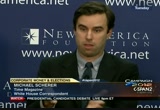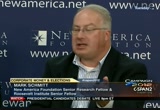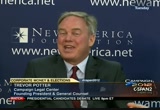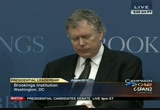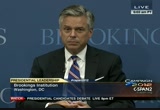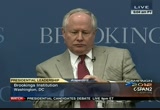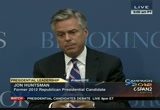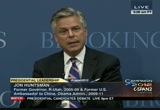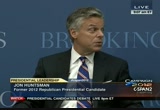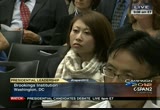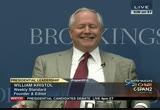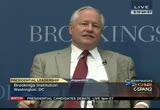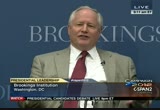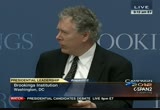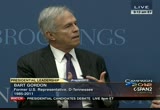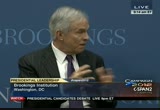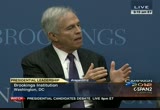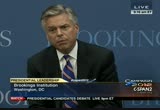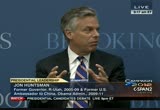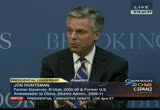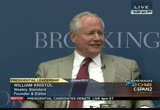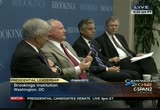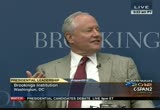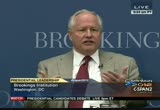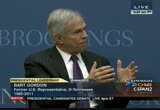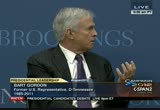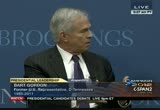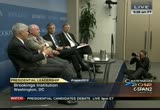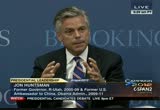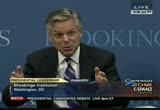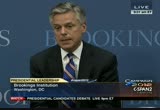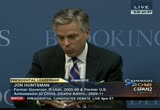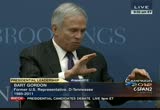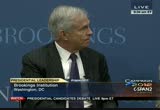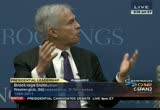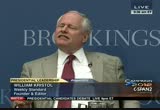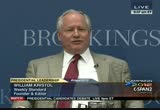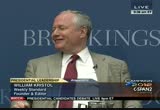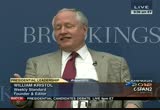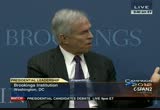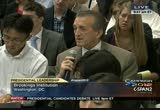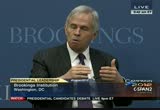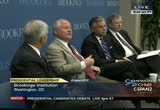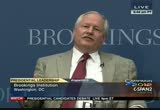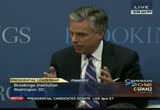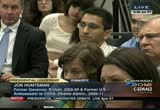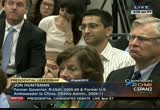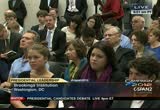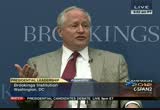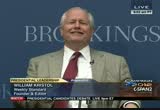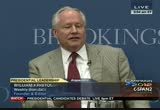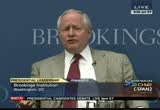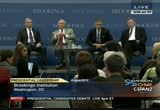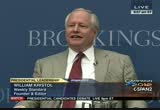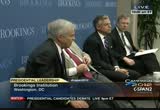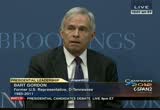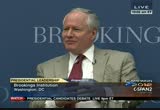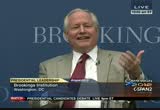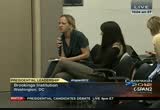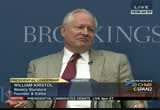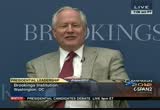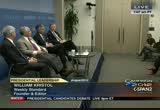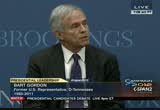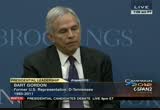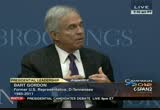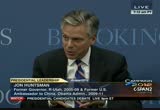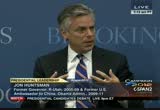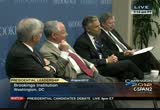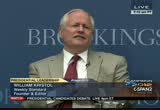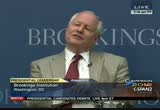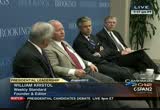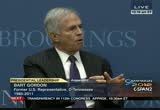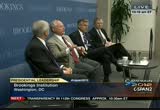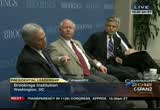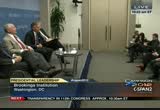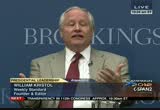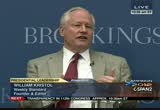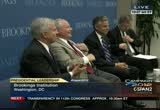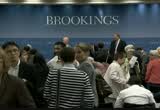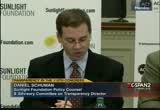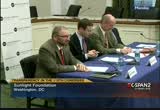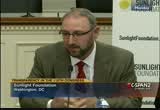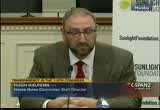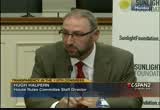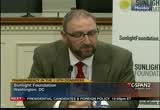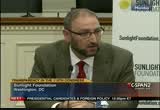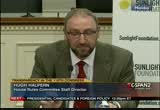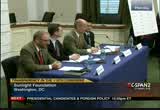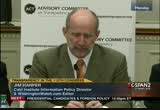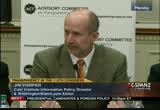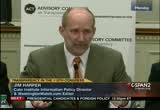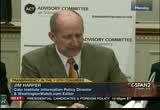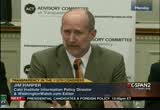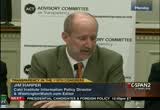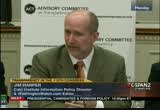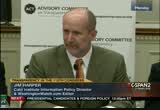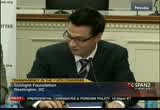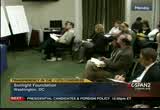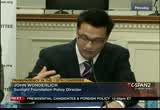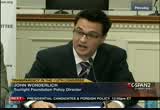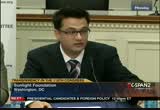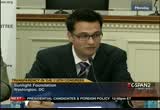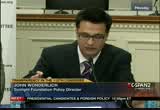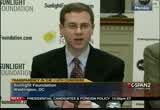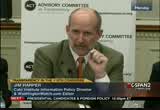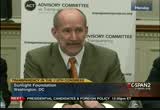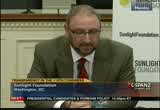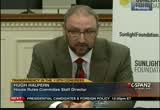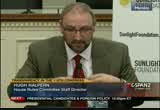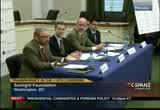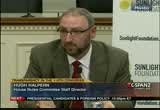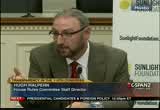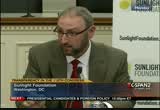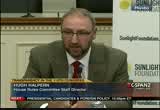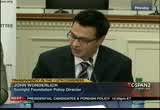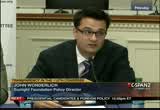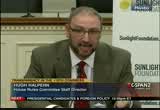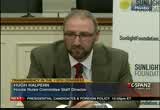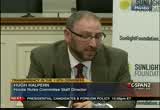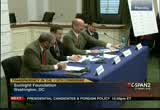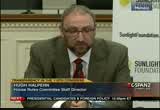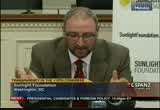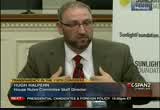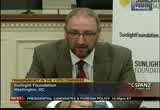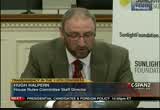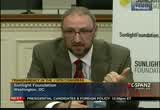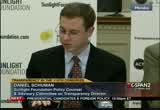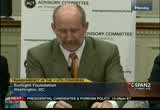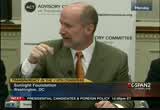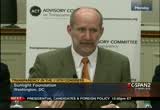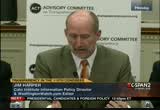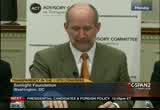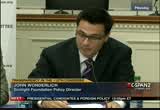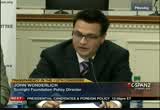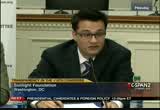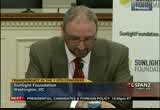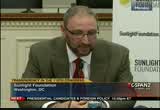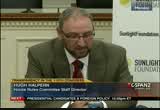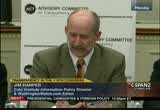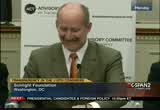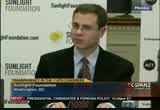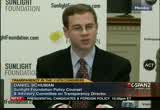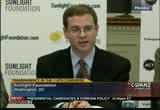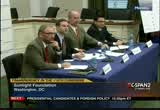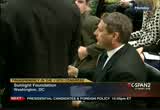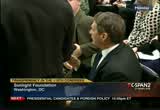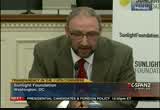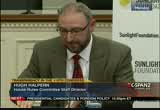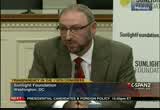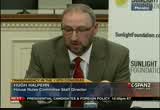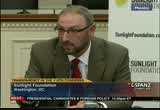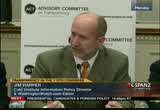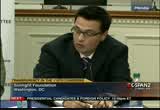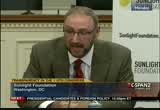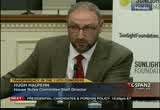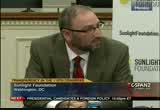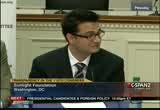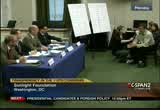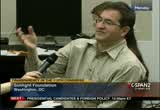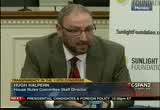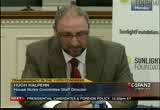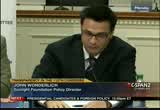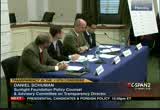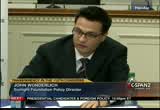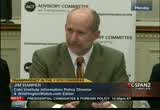tv U.S. Senate CSPAN October 3, 2012 9:00am-12:00pm EDT
9:00 am
disclosure reports. and so the answer is we need groups like yours do a lot of this, sort of the work in between. there's a couple of other groups who do it as well. and we just have to keep trying. the problem is not, the bigger problem in immediate is what don't distinguish between two. we don't try and explain. not when we explain and people to not because that happens also. bigger problem is if you don't make clear that there are totally different rules for different sets, rules are very complicated and some groups are not disclosing. we know who they are. spent if i could just say, [inaudible] i think it's been extraordinary this cycle. i think really impress. what michael has been doing. what michel's successor at "mother jones" has been doing. i think the story in the times has been doing an amazing coach.
9:01 am
but the 501(c)(4) story, it's kind of unprecedented and this is not, i've worked for a lot of nonprofit. i've worked for foundation. 501(c)(4)'s are supposed to be, nonprofit and they will allow a little bit. they are not intended to be used as political vehicles. that's not supposed to their primary purpose. and the agency is prepared, the irs is not prepared to submit deal with this thing that is in their nonprofits on which is not really what they're supposed to be doing. that's the biggest thing that happened, it's just a direct violation of what the intent of -- not the campaign finance law by the textile of what 501(c)(4)'s were supposed to be. spent i think it really is complicated. i had an interviewer reporting to me how i start talking a 501(c)(4) in the start menu set my personal goal is never to mention the phrase 501(c)(4) in my article. that's why stephen colbert was so good. he could managed to distill all this in the four minutes and try to explain why you should care.
9:02 am
[inaudible] >> stephen colbert -- [inaudible] thank you for coming, and come up and asked for follow-up questions later on. [applause] >> leading up to tonight's presidential debate, a panel of experts now with some of the leadership styles of president obama and republican presidential nominee made wrong. former presidential hopeful and utah governor jon huntsman, congressman bart gordon, and weekly standard editor william kristol among the speakers at this event, life here at the brookings institution. it is just getting under way. >> leadership style and approach to management. so the questions we will be looking at today is how does the total presidential campaign shed light on the leadership qualities of president obama and
9:03 am
governor romney, and what does the camping experience, as we've seen so far, indicate about the approach to management and governance. today with a simple and outstanding panel of speakers to help us analyze these questions. jon huntsman is a past presidential candidate, so he has a lot of authenticity to discuss these leadership questions. but if i know anything about the subject matter i wouldn't be here today. [laughter] >> we are still please you are here. >> the important discussion today. >> many of you know that jon huntsman was elected governor of utah in 2004, when he compiled a very distinguished record. he oversaw major tax and health care reform and also major improvements in public education. following his service as governor he was appointed by president obama as the ambassador to china in 2009. he left that position to run for president and gained tremendous respect for his forthright
9:04 am
discussion of important policy challenges. this fall, governor huntsman actually joined the brookings institution as a distinguished fellow, so we are pleased to call in our colleague. bart gordon is a practicing attorney and partner at k&l gates and also a distinguished fellow at the council on competitiveness. bard is a former u.s. representative from the state of tennessee. he served in congress for 26 years from 2007-2010 he served as chairman of the house committee on science and technology. bard is working with the brookings institution to improve public sector leadership as part of our new initiative on improving leadership and management. bill kristol is the editor of "the weekly standard," which he cofounded in 1995. prior to starting that he led the project for the republican future. he also served as chief of staff to vice president quayle and secretary of education bill
9:05 am
bennett. he also served as foreign policy adviser to senator john mccain. i'm sure all of you see built regularly on "fox news sunday" and the fox news channel. i actually met bill in 1981 when he was a very young, assistant professor at the university of pennsylvania. it's been great to see all the things he has accomplished since that time. so the questions i'd like to pose for each of you come and i'll start with governor huntsman, what does the 2012 election reveal about the respected leadership styles of obama and romney? >> probably not much at this point. >> well, this panel is over. [laughter] >> see you later. >> so you can extrapolate a few things from president obama's first term that might be instructive. he isn't a manager. he is not come he doesn't have a history of managing things, so you bring in a lot of good well-trained smart people, given
9:06 am
the tasks and you try to lead a government. and in the case of governor romney, who has been a governor, who is a business guy, he's run the olympics. i think his attitude would be efficiency, i'm going to come in and look at running government like a business, which sometimes isn't the right answer because government isn't a business. you can always find efficiencies, and you should always be looking for efficiencies, but i haven't seen a good example yet of a business person to come into government and make it run like the business. there's a lot of talk about that but we forget the cultures are very different, and the presumed outcomes are different as well. but i think we are missing here is an opportunity for both candidates to be leading, using these very important weeks ahead to lead a national discussion on priorities. you know, to befriend the real
9:07 am
priorities for the country which seems to get lost in the carpal or the tech have any, the message of the day. but it's probably not unusual because you look at the elections past, whether it was president obama talking about renegotiating nafta during his campaign, or wasn't to be. bill clinton butchers of beijing. he ends up forging a pretty strong relationship with china. so i think you have to discount a lot of the rhetoric and a lot of what you hear about, about priorities at this point. and probably conclude that when they do get in office that the harold macmillan words will probably drive things more than anything else. and that's defense, my dear boy, events. and then we get back to what you are saying. what will be their management style? what will be their ability a
9:08 am
stunt history to respond to those events as they arise. spoonbill, what leadership is have you picked up? >> i think we have an incumbent president so presumably we know how he will be inclined to cover but i suppose one could argue that maybe not becoming, obama took over and over nine in a very unusual circumstance, huge majority in both houses, wind at his back but also apparently failed administration, huge financial crisis. he did various things we could second guess them or not, but rahm emanuel is as chief of staff, they're presumably because he understood how to manage congress, and that too much of a surprise have some differing to congress. may be on obamacare well. he left and is now mayor of chicago and then, of course, there was a 2010 in election and then president obama had a very different circumstance but it may be that actually he gets a new start if he wins in a way. it's hard to know exactly the
9:09 am
congressional split will be but i assume they will hold a sin if you and i assume they will narrow the margin of the house. so it might be that action in terms of president obama, my normal instinct which is to say we know what he will look like in 2013 as president, i'm not so sure that's the case. i think there may be new white house officials from chief of staff, national security advisor and the like. governor romney, so i think with a bomb at a little more of a question mark than it would only be for an incumbent president. and then for governor romney, he's only been coming -- is a thin resume for a presidential candidate in the sense that one term governor and a typical state where he had no, you, almost no support in the legislature didn't really run on much of an agenda, change things and messages, take over for republican governors. is the toshiba was a health care
9:10 am
bill which i just seem like a good idea at the time to him. so i don't think it's the right situation to the olympics is about a copper by. business i agree with john isn't culpable. in a funny way it harder to anticipate to me at least what they're white house administration will look like in 2013. that it may would normally be the case if a bob dole or jon mccain or bill clinton, these are people of been in office a long time either innocent or governorship, i think one had a sense of how their strengths and weaknesses. i'm not sure either case you that we now. and the question is i suppose the campaign, what have we learned from the campaigns. i'll think about that for a minute and let bart -- i think it is an interesting question in this case. >> it is a good one but there's no obvious, there is no obvious thing that leaps out that you can save look at the way romney has run the campaign, therefore he will be this kind of president.
9:11 am
and i think enron mike lee, and maybe an obama's, too, there's a pretty sharp -- campaigning you have to go through to get elected. it's not a place unfortunate i think he really make serious arguments and really educate the public. as ron himself is said, very revealing, my test is to get 51% of the vote. of course, they will think that. it's a funny thing for a candidate to say, but that's what he thinks about campaign. you can be a very serious president as george h.w. bush was. i just think electoral politics is not the world. i really don't understand. i hire these guys help me get over the finish line and i forget about these areas but it's not everyday to this point of view. i do think it is, it does mean you maybe can learn much about how he will govern from the campaign. and in president obama's caseys in such campaigning mode for months, and it's clearly, in his
9:12 am
duties got to say the country from romney and the republicans, and, therefore, is going to get his 50.1% by cobbling together various groups say can either appeal to or scare him enough about the prospect of another republican administration. but i'm not sure anything he is saying is telling us what he would do in 2013. so it's a funny kind of, for a moment, i very much agree with jon, a device a big debate about the future of the country, we are not getting it. and i don't say that necessary critically. they both are doing what they feel they have to do, but it's a very small campaign for a big moment and, therefore, maybe not a very revealing campaign for what either would you as president. >> an interesting comment about the 50.1% because all politicians i know always went 50.9%. i was talking and he said this is really great, 65%. he said no, i want 90.
9:13 am
congressman gordon, your thoughts on obama and romney's leadership. >> well, if we tie back to the campaign in to the 50.1%, i think that is telling. i was with charlie cook last night. he is one of the political and gnostic hitters around you, and charlie famously said something back that is present obama is related it will be to spite the economy if governor romney is elected it will be despite his campaign. and i think that is playing out right now. and i think part of it is this 50.1% attitude. i think the other thing, governor romney i think grew up in a privileged environment. just like i want to get my daughter all i can come his father wanted to do the same take. mccain was somewhat isolated with the schools and elite i think sort of thinking along the way. and i think he also, his parents
9:14 am
instilled upon him that because of those privileges he had responsibility. and that is what you might say class had responsibility to give back and to be a leader later. so i think he wants to be president because he wants to make good decisions. he wants to, with circumstance brought before him as ambassador said, he wants to reorganize the government so it's a vision. but unlike bill clinton who could tell you 137 things he wanted to get done, i do think governor romney can tell you what he wants to do. he just wants to be a good president. and because of that, you know, if he is weaving around out there, the campaign doesn't have a balance. you saw as governor he was a very progressive governor, and in massachusetts until he started looking presidentially and then he veered over. and the primary season very much over on the right because he was trying to get that 50.1.
9:15 am
he wanted 50.1%. and so when you don't have it, i don't say doesn't have principles. he is very much a principled person but he doesn't have a political philosophy. he doesn't really have things that he wants to accomplish. and because of that, the campaign is wandering. he's wandering, and i think that what you get into office circumstances do takeover so you would have to have a focus on what you want to try to get done. and i think that is so far has been somewhat of his downfall for governor romney. i think that potentially could carry over to the white house, where if you look at president obama, and again as everyone has said we don't have to look at the campaign, we've been able to see, he doesn't have 137, like president clinton, but he does have those few things that he wants to get done, that he is passionate about. and you will see within him a
9:16 am
disciplined and a real focus it and i think you can see that also reflected in the campaign. so again, just focus on the campaign which was carried over i think as much as it could be two his election. a personal disciplined but not a real philosophic base, and so the campaign wanted. so i think that's how you will see potentially carry over. >> thank you. so governor huntsman, leadership involves not just leading the executive branch begin with legislative branch. so on romney, what would you expect? bill has told us all of about is relationship with the massachusetts legislature, so what should we expect from a mid-romney administration in terms with congress? and then with obama, in the second term, would he do things differently or what would you suggest that he do in terms of
9:17 am
congressional relations? >> my sense with president obama is he would learn or at least be instructed by those around him to learn the mistakes of his first term, as it relates to keeping with congress, which i think has been a disaster to hear from members of his own party on capitol hill, we want to do a deal come we want to strike out and get things done, we don't have any real engagement on the part of the president. and i think if you want to get bold initiatives through, you know as was the case with health care, you just don't and something over to the legislature and say, take it. you frame it. you find 80% of it and turned over to the legislature and to get it done. there's got to be some wiggle room for them. it's got to be a win-win but you got to frame the outcome 75, 80% in order to drive it home. that's the president and that's the executive branch who then drives it based upon the bully pulpit. so i think there will be
9:18 am
probably some rethinking about their legislative strategy, if there is a second term. with romney, and i'm just guessing here, that this analytical consultant like approach to dealmaking, let's remember that governor romney isn't a ceo, wasn't the ceo as much as he was a consultant, a corporate consultant. so i think he's very well schooled in how you get deals done. he's done a lot of deals, done a lot of transactions. and i think that transactional mindset or philosophy will probably carry over if he becomes president through his interaction with the legislature. and that we want to i need to get done, how do i frame the negotiation or the debate, much like a merger and acquisition discussion. you go in behind closed doors. and negotiate an outcome, and you move on. my sense is he would be more of an engaged hands on negotiator,
9:19 am
because that would be a natural carryover of what he has done during his professional life. my concern is this, i think we are losing some very valuable time in these weeks, as in now, to properly frame the two or three things that must get done. so just in my own experience as governor, i found that teeing up the priorities can you can't have 100 of them, you will never get anything done, but you can frame two or three big things that must get done. and then articulate a message consistent with that to the voters which then puts pressure on the legislature or members of congress so that you are partly owned by the election. and i think that's where these weeks ahead could be critically important to framing, teeing up and i should have done some of the negotiation before the election because i do believe that honeymoon period, even if there is one any more left in
9:20 am
politics, probably getting shorter and shorter, so you've got limited time in which come as a new president or a reelected president and asked to get those one or two things done. and they darn well better be articulated and teed up and framed in ways that get you at least part way there by the election to. >> it's not going to happen. i mean -- so i think, i mean, i would predict here, as a pundit, that they would not be a series articulation or from other fundamental choices facing the country over the next five weeks. they are both running the kind of campaigns and i don't think it will suddenly change. it's not what i would've recommended for republican romney but i think he would be better off looking sort of commune, conservative or reformist agenda campaign but he's running a safe, let's have referendum on the past four years and also don't worry about the next four years if it's like the last four years but it's striking romney's team announced monday his campaign over the
9:21 am
last five weeks, what, the next four years will be no better than last four years, something like that. very positive. if you elect obama. i happen to believe that star and that's why i'm not for reelection president obama but is not a very inspiring forward-looking spoken about what mid-romney will do. it's hard to blame the guy who wants to get reelected with a pretty narrow cast, casting approach to democratic and independent constituencies to try to scare them about ron is just bush, there is a war on women and all that but i don't go get the kind of frame you would like. i'm a little is pessimistic. i do think reality matters, as we've been saying. we are going to hit the cliff in all kinds of ways. be any fiscal cliff in the real clip in 2013 is you can't sustain these deficits obviously for too long because they can't keep printing money and expect the world to take it or buy treasury notes forever. the economy is slow and they
9:22 am
will be coming into another dip. they are foreign policy challenges i think the next president will have a moment between november 7, i agree just to begin november 7, on january 20. and i don't know, summer, fall of 2013 to do a lot. and i would bet that there would be a huge legislative agenda in 2013. i think whichever ones when can i do by the gridlock argument. if obama gets reelected he will have kind of a mandated basically. i mean, to go with his version of a big deal which will be bowles-simpson, the left version of bowles-simpson, let's say bowles-simpson with a tax hike for people over 250 or 500,000 or in a little less tight new form. if romney wins he will have a mandate for some version of the ryan budget, probably temper a little bit to get some democratic votes. if he becomes president i think we'll have a mandated something close to the.
9:23 am
either way we'll probably get a big deal, plus with the pressure of the debt limit and other things, the market out of, i think 2013 becomes a big entitlement reform, tax reform, budget reform. moment. it does mean though, this sort gets to john's point, there will be an amazing pivot on november 7 and sunday the campaign will be over and president obama let's say a lot of people who voted for him, yeah, guess what? we are going to do and come reform, and guess what, all the stuff i said about how mitt romney will destroy america, something will be do something that will not look at wildly different from some of the reforms that the republicans talked about it and, of course, romney will have the same problem with pivoting. i think the romney campaign, the romney transition team led by jon's predecessor is working pretty seriously on what they would have to do. but the disconnect, i don't know if this is good or bad, honestly, i don't know how bad it is, disconnect in campaigning and governing is now something
9:24 am
close to an all time high i would say. you have a conversation with stuart stevens and running around campaign and then have a conversation with mike was running the romney transition team is two different world. obama is omar khadr get and that of many private conversations with his people but i also believe he's not that dissimilar. it's a very different conversation than the one you have with jack lew or whoever is fully thinking through what obama would actually do in november, december of this year, and then the first six months of next year. so i don't think it's impossible. i think maybe it's just the way we're going to have to conduct ourselves, pivot extremely quickly after election day and get about the business of governing. i don't buy the argument that the partisanship is so bad that you can get democratic votes for republican budget or vice versa. i think there'll be a certain momentum to do with these programs where the reelected the president for elect a new president. so that will be an unusual
9:25 am
situation, when we haven't had a long time, that degree of certainty and mandate i think. but in any case, i think, but it's not going to become we are not going to get a lot of clues about this in a funny way over the next five weeks i don't think, which is unfortunate. >> congressman, your thoughts? >> you can speak to this as a former -- >> the partisanship is very bad and they will take leadership to get to do that they're going back to the ambassador's comments about how romney would govern, i fully agree with the dealmaking aspect of working with congress to resolve it as governor of massachusetts. he brought democrats to the cabinet. he really develop partnership with the democratic legislature and did a good job. i think he, personality wise every way, will do well there. i also think that he will try to bring his efficiency to the executive branch and he will be a failure at that.
9:26 am
bureaucrats feel like they will be there longer than you are. these elected official. they sort of know what they want to do. they're going to do it and rope-a-dope you and maybe you can do a little structural changes, but by and watch it is hard. he will have more trouble with his own executive branch, i think, and he will with the legislative branch. let me disagree a little bit with president obama on his style. in a second term as a president, that's a legacy term. you get focused. he is going to pick out something so wants to get done and he will get very engaged. i would also disagree some with the health care, in that i think that was, again, he came in with a platform of crisis, with everything falling apart. not even really knowing how bad it was, but with health care that was something he really felt he wanted to do. i was one of those holdouts on
9:27 am
the -- there was just a lot thrown at is really quickly, and how does it all fit together? and so i wasn't ready really to sign up, and there was a few of us like that. half a dozen at most. and i was at the white house a lot, in very small groups with the president. he was very engaged both in the issues and also in the persuasion in trying to bring folks together. and i think you'll see that with his immigration reform, invitation of the health care bill in this next congress. there will be some other areas where it will be legacy. and he will also i think learn from the mistakes of, i think george bush the second was much a similar way and then, you know, he wanted to read a book, go to bed. he didn't want to fool around with congress. and it didn't work very well
9:28 am
early on. toward the end he got very engaged, and once again, it was sort of interesting, you may see this with president obama. towards the and, president bush really felt somewhat ostracized from his party. he felt they were letting him down in the sense that really the right wing, he could never do enough for them, and he just come he was really frustrated. and for some reason i was a blue dog democrat, and i think he felt that i was being shunned by the liberals. i really wasn't doing but he just wanted to talk about how do you deal with, you know, the other part of the party not liking what you are doing? and i think you're going to see, as bill pointed out, the president will step forward and say yes, we have to do some type of reform. and he is going to get it just like president bush got it. but i think he will have learned people reach out just as president bush did in those last
9:29 am
few years the congress and i will think would've a much better job spent one of the noteworthy aspects of the past four years in the obama administration is how much policy has been driven from the white house. some presidents at least give lip service to cabinet government and empowering their secretaries. obama seems to have gone pretty far the other way. so i'm curious, one, in a second obama term was a continuation of the pattern, and with romney how do you think he would run things in terms of the relationship between the department and the white house? governor. >> i think we've strayed some distance from constitutional government in the sense the white house staff has been built up with layers of folks who kind of cushion the president from the departments and agencies. so i compare and contrast just by being a low-level staffer under reagan on the advanced staff, and seen that the universe of high profile cabinet
9:30 am
members who interacted at least from what i can see, more directly with the president. and now we have layers that kind of cushion the president, a deputy chief of staff for policy or whatever the case might be. and i think we're drifting farther and farther away from that interaction that i think is so important to good government. the president and acting with the cabinet. i don't know that obama is going to change that. that's his operatives do. but, in fact, it was similar to that under bush. i noticed his deputy of u.s. trade representative i do think is going to change that part of the. i do think it needs to be changed. i think one of the reasons you can't get good people to sign up or to volunteer or to move toward cabinet level positions, once a look into, and i've heard this from well-known ceos in the country, when they find that well, i am one or two steps removed from the president,
9:31 am
being at the commerce department or some other place, thank you, nomad. i'd rather not do that. so i think there are two things going on here. one i think there is an efficiency issue. when you're more removed like magic him and i think you run the risk of not being able to bring in top flight talent who want to interact more at the highest levels of government, given what they might be coming from. with governor romney, given his background and his view toward efficient organizations, he will probably coming in, take a look at it, do the metrics, run the numbers, bringing the pain in the mckinsey consultants and tell him what works and what doesn't. >> it better not be the bain consultants. >> maybe they will regain some luster after a victory. and then make some decisions there. he has a huge opportunity, let me just say this, a reform
9:32 am
minded president as you would hope governor romney would be if elected. because i'm not sure that president obama is interested in this, or he would have i think moved in this direction. so we have a 20th century construct in the 21st century. if economics is going to drive our foreign policy more, just as i settle, we have four or five different agencies, departments, that are part of the international economic decision-making apparatus when you to have one. and it needs to be streamlined. the commerce department, the treasury department, ustr, state department, all these groups with a little hand or role in international economic policy making, and i'm guessing somewhere like governor romney would step in and say, our foreign policy needs more of a healthy dose of international economic involvement more in the way of trade, for example, which i think president obama has dropped the ball on for most of
9:33 am
his four years, and we, therefore, need a structure that allows us to get there, hard as that is to do. and one would hope that even the smart analytical folks he might surround himself with, those are used to looking at complex corporate organizations, they would actually make some recommendations that would bring our bureaucracy into the 21st century on things as important as international economic decision-making, just to name one, there are many others. but that would be my sense of its. >> that would be very good and he would deserve a great service to the country. but once again he would probably waste his first four years. you have the bureaucracy itself that you have to deal with. plus there are a lot of authorization but when you start changing the pieces around on the table you've got to get congressional approval. for example, right now they're trying to move -- what we call, there's a wet now and a dry know what. and i'm or fish or raccoons,
9:34 am
what ever, however you might want to look at it. so it makes no sense. so they are trying to again make some changes there. but barbara mikulski hassam noaa the cells interdistrict. so it is not much of executive fiat a lot of this, so as much as needs be done it will be difficult to do it that would. you also almost have to take a structure that you have, then again you have to be one minded on two or three different issues and have to bring the captive together. has much of with trade it's not just one area. there's more than one bureau or agency there. and you really have to have the cabinet working as a teen on two or three issues, and driving it down, just driving it right down all in sync. and you can only do that on just
9:35 am
a few issues. >> i don't disagree with that, and a much smaller level, having reorganized government when people say it can't be done, nice try bu but you will never t a. and doing it, when was the last time we had a president actually stand up and say that part of government ongoing to reorganize the following way for the following reasons? i've worked for the last four presidents. i get a member one of them standing up with clarity and as a postage is appoint people to sample departments and agencies saying it's going to look a little difference -- different and here's what what we're going to do. for competitiveness purposes, and then driving the narrative from there. you will hit of course that difficulty as you mention, mechanically, with congress. there's no doubt about that. but let's at least start the conversation. >> you be taking care of taxes and budgets and entitlements and all that, you know. if it was clear pretty day, then
9:36 am
it would be again a good task and something that would serve a great purpose. but you're going to have to all hands on deck over this next year dealing with the budget. so it's going to be hard to do that and then also to drive the of the. >> is it possible to reorganize the federal government or is it a lost cause? >> i think it's hard. some of it. the authorizing committees in congress are huge problem of course. if you want to try. but i was a unfortunate if congress legislate laws that preserves the perks more, because they have to do something, and since it's not going to give credit for passing the legislation, they don't authorize legislation anymore which is what the one supposed to do. we are authorizing committees cannot protect particular little parts of departments that they basically control or particular programs that have authorized 20 years ago. whatever. i'm a little shocked on the when i came to washington in 85.
9:37 am
>> it was considered questionable a little to get too much into the administrative side of a departments activities. there were some issues of improper influence. a lot of these grant programs and. the degree to which congress now just figures, you see all expected weaker from different congressmen and sinners, you just feel they have the right to tell the agencies what to do with the assistance of an undersecretary level on programs that they of supervision over. it's a little bit can is not from the to i would say efficient and sensible administration, equitable and administration. that is a big deal. i would say on the romney side i do think though, i think what you think him and i don't disagree with what they are thinking, we have, we have a huge agenda in 2013. we probably only have six, nine months to do it, november 7, september 30 will be the outdate. probably really want, august
9:38 am
when you have to pastor huge reconciliation bill which will include tax reform, entitlement reform. i think probably tax, certainly time for reform. i would say dealing with obamacare if romney wins and replacing large chunks of it. and so all that has to happen very fast. they cannot do that normal cabinet process is obvious he. so give him an extremely strong white house in omb and treasury for the six, nine month again. i think the right way to think about it is to think of almost be to romney administration, sort of november 7 them to let's say set timber 30th, 2013, which is deal with the immediate issues that got to do with. and that's going to be very much mike levin, chief of white house staff, paul ryan as vice president who knows a heck of a lot about this and whoever is the treasury secretary meeting twice a day i would guess at the white house at 9 a.m. to 5 p.m. with senior white house staff
9:39 am
and maybe the hhs secretary needs to be in as many. and everyone else is getting their asses and sectors confront a getting to know the authorizing committees on the. than the rest of the romney administration were hoping would move to more of a modernizing government and a whole bunch of other things that could be done in a bunch of departments which we need to be approved. but i do think at least my sense is the romney people and i think you're right about this, very focused on the first six, nine months. if you want to do that you do need a extremist on white house and omb control. if i were advising romney i would say here are my best a people, put them all in the white house, only be and treasury at the beginning. they need the best most expense people who, you know, to really make those decisions early and/or with conficker i would also get a couple people who have either served or are very
9:40 am
funny with congress to run a process. it's obviously, you can't dictate to congress. they're going to need to make that stuff happened very fast spent are you indicating czars? >> well, no. just a very strong white house chief of staff. very strong budget director. reagan 81 would be a model with stockman before he decided he didn't like the reagan agenda. jim baker and others, very strong legislative affairs office. and really ability, it was impressive what they did we look back on, picking up 70, 80 democrats in the house. we look at history, reagan won and, therefore, inevitably going to get all the stuff, that's not how the code works. it will be worth looking at those. >> governor ronny wilson have difficulty. just a change of administration. and a confirmation process right now is awful.
9:41 am
and so you probably will have to have the new term for czars are, that are in the administration trying to kabul together the jurisdiction of greece agencies to push whatever needs to be done. spent i'd like to involve our audience here, so if you have a question raise your hand. we have a question over here. we have a microphone over here, if you can take it over here. if you can give us your name and your organization. we would ask you to keep your questions brief so we can get to as many people as possible. >> there was al gore's reinventing government, but really what it comes down, no matter who is elected, the president at that time should come up and say look, we can't do it with democrats or we can't do it with republican. we have to get a bipartisan solution to this. the next president has to get the leaders of congress but and
9:42 am
also it wouldn't be bad to have governors, states governors come in and say look, we're in a crisis. we need to get something done. forget your party, let's get it done. spent i think that's what albrecht would like to see, but the model for congress, and i say congress, the house or the senate, if you want to go from minority to the majority, the model has been well established a if you're in the minority and to try to stop the majority from getting anything done, even if you're halfway, mostly for it, and so again, as chairman of science and technology committee, not nearly as difficult odyssey as many of these issues, but we passed 151 bills in resolution in those four years, all were bipartisan. and so i found that it is responsibility of the majority, whether you're the majority of the house, the senate or whatever you are, it's really the responsibility of the majority to reach out to the
9:43 am
minority. and sometimes you have to go, again when mitch mcconnell says his job is to see -- it's tough but you may have to go down to lamar alexander to commit to go down to somebody else. whether majority of the house, the majority in the senate, whichever party is with the president, they have to really reach out, they have to stoop over. and then maybe you can get a little cooperation. >> and there are two models how to do this but i don't really have a view about which would be better in 2013. one is the leadership deal model, which is andrews air force base in 1990, president bush, dick darvin making a deal with the democratic leaders of the house and senate. or gingrich, clinton in 87, there's plenty of legislation the other model would be reagan 81, bush '01 on the tax by which is to go pick off 10 democratic centers, or 70 democratic house
9:44 am
members is a republican president, or vice versa, a democratic president reducing. and i think be an interesting question for romney to does he think he is to sit down with harry reid or does he think he has to go sit down with joe manchin and mark warner and eight other, and i think the same for president obama. i think, i think republicans are underestimate how strong obama will be if he is reelected. and i don't believe boehner if he is a 15 vote margin and as i don't think he can hold all the republicans against an obama version, for example, but they're still in of moderate republicans. the leadership is stronger than it used to be. i think they have more leverage over mbs, partly because of campaign finance issues and other things. but having said that, i think obama going to some lamar alexander's of the world, there are some the covens in the house, even if the democrats don't control both houses of congress he would have some leverage to go around leadership is leadership -- that was the case of boehner i suspect. he will feel he is obliged to
9:45 am
cut a deal with obama in 2013 is romney lost. people said bipartisanship there are two forms of abortion she. one is leadership negotiation, the other is -- [inaudible] spent with the premise is the has to be personal relationships developed as well before that can occur. and i think the ambassador pointed out while that governor romney will have those talents. i think now that president obama knows he has been. he is just going to have to now demonstrate their more. and be more engaged. >> so the reality is this, we are a few short weeks away from the real work starting. and i think bill hit it right on, and a totally agree. i think to be a moment of real clarity after the election. we will all wake up the next morning, some will be happy, some will be said. and then the expectations will be there. we've got to move.
9:46 am
and i think people will start thinking a little differently about this between november and january, and what needs to get done. because i think the fiscal cliff and the reality of a downgrade, and s&p downgrade and impact that would have on the markets, i think it's very real. i think that's going to focus the attention of a lot of people, which is a good thing. and if you believe that period is going to be a productive period. made more so than people might imagine today. but you raise another good point about governors and having been one, here's what the next president think has an opportunity to do. having been chair of the western governors association just highlight this point. i don't remember a time in recent history where a president has actually used the governor's effectively to drive policy. if ever there was a truly bipartisan group, people who actually do stuff and have to go back and report to their constituents, or else you do get reelected, it really is a can-do
9:47 am
problem solving body for the most corporate and to have a president call in the 50 governors early on and say, republicans and democrats alike, we are all in this together and we've got a period during this very important 10 month stretch ahead. here's what i'm going to be focused on. i know some of you might disagree, but hang with them. here's what i'm going to be focused on, and as for you i need help on things like energy policy. because that's going to be hugely important, and i want you to drive it because so much of it has to do with our public lands and attitudes locally that will help me help you in making this unreality. i think engaging, harnessing, and even asking for the help of the nation's governors. so typically me with the present once or twice a year and you get briefings as opposed to the present thing i need your help, please go out into the. i need help on health care 2014 is run the country. wing-ism clarity, your help. i need help on energy policy.
9:48 am
here's the broad framework. let's help to fill in the gaps and make it a national effort, if you will. i think there's huge untapped potential in that area that could speak to bipartisanship. >> i agree with the. i think the biggest policy achievement probably the last 20th minute and welfare reform. 25 years i guess. now, 15 years, 96. that was done by clinton, begrudgingly accepted after modifying its on the other governors have a huge role in that a thing. angler, thompson, underpublicized and a couple democratic governors. so i think you could imagine that, if you can do serious health reform, the republican version of health reform which was medicaid back to the state shouldn't have a very serious, and truthfully even obamnicare will depend on the states. so you do need to have a series conversation with governors who understand the issues. >> and to that end i think
9:49 am
governor romney be in a position to at least instinctively understand the culture of governors, how to harness them and energize them. >> other questions? right there on the aisle. there is a microphone coming up. >> governor huntsman, i'm with whistling thing, you stated the president has an opportunity set a framework, and so congress has been addressed a lot, and things like filibuster reform or the inability for congress to push major reforms were bills. will romney be more successful in that? or is a new congress, do they have an opportunity, doesn't have an internally or with a new president the fact that vision? >> i think this is where the executive branch has enormous power to set the agenda and to frame the issues. my only comment here would be to
9:50 am
simplify, simplify, simplify. when you're in an executive position like governor, which i assume is much like the presidency, bill has been very close to this, you have to simple by your list of things that you're taking for the american people and congress. because your ability to get things done i think is pretty limited, and you have to be realistic about that which is achievable. and so for the next president, i think, i think framing the two or three must have items as opposed to wandering off. it's nice to talk about reform and all of that intervention will have to have some serious conversation in this country about broader reform efforts. i do believe the next 10 months will require a very precise delineation of the two or three things that are the must haves. and he'll probably be around tax reform and spending it and if he did so in something around energy policy. we could get to the next year,
9:51 am
tax reform, along the lines of some simpson-bowles deal, phasing out loopholes, broadening the base, a target has been over the next 10 years, something between the ryan plan and simpson-bowles, you know what is likely to end up. and then have energy -- i think natural gas is going to be probably the most powerful boon to our nation's bottom line than we've seen in probably two decades. and could very well established kind of a review of our manufacturing muscle in this country came and what our expectations ought to be going forward. i think it's going to be hugely consequential economically. that's just an example of maybe three things that could be outlined without wandering off into also reform areas. nice to talk about, but probably not realistic given the reality of political constraints over the next many months. spent all three of those can be done with one deal.
9:52 am
reconciliation. >> just think about this, too. one -- will have to -- that can be misleading. so if we were sitting here in 2002, 10 years ago, is that we would say about 20 years. there's been a heckuva lot of legislation. a lot of it can take legislation a lot of it with some bipartisan support. there's reagan 81 with budget, reagan 86 tax reform genuinely bipartisan. there's immigration reform under reagan with alan simpson, bipartisan. there's bush 90, the budget deal, his own party rebelled against him but nonetheless passed with bipartisan support. than bush 91, the americans with disability act and some other legislation, environmental legislation as well. pretty important clean air act. then we did under clinton after some partisan fighting we get welfare reform. and bush in '01, both his tax bill with some democratic support and no child left
9:53 am
behind, genuine bipartisan support. so if you're sitting in l2 i think a stingy come with 20 years where usual partisan fighting to defend is pretty big legislative achievement. things change but i think to some degree in '02, we can leave aside blame, became very partisan, foreign policy starts to dominate. whatever reason bush didn't have much, he tried. to be fair. certain a lived on immigration. partly because i do think it's fair bush and mccain would say the democrats having talked the game were not willing to give republicans a victory or legislative achievement on immigration. obamicons in. i don't think this was inevitable. i me i know people say much, want to be and the republicans were so right wing. they were so demoralized. believe me, i was there. a more skillful legislative
9:54 am
strategy on the part of obama. maybe you can explain is why rahm with the way he did. then in my view, he instantly went with health care instead of stuffed with would've split the republicans. the republicans were going to fall on historical wall street but it would've been ludicrous. i would have supported some version of that in early '09. instead they stupidly did a bipartisan steam is bill and went right to health care and, indeed, made you guys vote in the house on cap-and-trade, and presented to push our check. it was nuts in my opinion. >> now we have crystal support spent i do support a version of dodd-frank. i would before breaking up that big banks. republicans ever problem. that be something wrong allowed to address when he takes over.
9:55 am
so anyway, for whatever reason, whoever is to blame, the obama administration became looked very partisan to the republicans looked very partisan, to keep our competitive. in 2011 had another chance with bowles-simpson which can we can squabble about who exactly, what obama should have done, whether paul broun should've voted for. whether -- there was a moment where it something could happen, but it didn't. i would be wary generalizing the last 10 years, to say the preceding 20 years would've been the model. and they do think that the system isn't so broken or so partisan that one couldn't have more like what we had in the '80s and '90s on a whole bunch of issues. and i think this really does to get to the original topic of the panel, the more i've thought about this just sitting, presidential leadership, skillful presidential leadership and real practical leadership as was rhetorical. i mean will be very, very
9:56 am
important to i do believe you could to immigration reform in 2013. i don't think it's really a huge substantive disagreement about that. [talking over each other] >> for the right piece of legislation, but is anyone going to step up and do that? and you could imagine 2013 it would resolve a lot of these issues. that is what a lot of these issues that seem a tractable. but it does require skillful presidential leadership. spent right here on the aisle. >> yes, good morning. retired foreign service officer. getting back to the subject today, which is what presidential campaigns reveal about leadership, in the past several months governor romney has advocated repealing the affordable care act and keeping parts of it.
9:57 am
repealing, revoking the dream act and keeping parts of it. my question is, you've all suggested suggested that either way deals will have to be struck on november 7. as to governor romney, hasn't his leadership skill been primarily one of lack of transparency and consistency? >> i'll defend governor romney. i've been very critical of them. he is for, i'm forgetting obamacare and i'm not for having, i'm not against having -- [inaudible] other such things which is what ron is trying to say somewhat artfully. and on the dream act i am in fact in favor of the rubio version of the dream act. that's not an intellectual position. i mean what ron is saying, it's easy to parent, to mock him a little bit but it don't think
9:58 am
it's a ridiculous position that romney is taking, and people and say you've got to be for the aca or a are you are against all health care reform. i think romney has real chance to governor with a center-right agenda. and the same obama, will have to come to the center if he wants to come. lest people think is doing a great job out there running $1.2 trillion deficits each year. >> back in the corner there is a question. >> sabrina with the "huffington post." the last couple of weeks in particular have been very difficult for governor romney and his campaign. they've announced a couple of recess or reboots at the golden. where do you think his campaign has been missing the mark? and what do you think he needs to come out and do both tonight and the first presidential debate and in the remaining five weeks?
9:59 am
>> yeah, so i ran for president and failed miserably, so i'm in no position to opine on this one, that's for darn sure. and i'm not much of a political analyst in a way. but let me just drop him a little bit of experience and say that, you know, it helps when you look into the camera and you speak from the heart in ways that about the voters to feel the sincerity, and the commitment to the issues around jobs and economic growth. ..
10:00 am
where is our bill clinton in the republican party. marco rubio did a pretty good job but bill clinton did segregated complicated issues. he had an intelligent conversation as voters want. they want a sincere intelligent conversation. no b.s. no head or hyperbole. give me the scoop and tell me where you can take us. that is weather is an opportunity. and the governor romney has that
10:01 am
capacity. , the candidate was addressing the general election. if you look at governor romney's problems, and 50.1%, trying to do what is necessary to get elected. there is some of that lack of sincerity. the other numbers 47. he went into this with the team year because he did not associate one around for people that much but the campaign hopefully has allowed him to better tune his year's so fast forward has to be tonight. he has to look presidential and
10:02 am
able. no long balls and that gets him started, and campaign these last few months. and they run a very poor mechanical campaign. they have to get field offices, that has to be corrected. >> the last year-and-a-half of the will forgo because once again to remain critical, analytically looking at the numbers today contrary to your question, where the actual poll numbers show they are not much worse than they were, not the
10:03 am
national level, they had a warning and sirius polls, if i were axelrod i would be a little worried. just as romney should have been ahead in my view two months ago and blew the republican convention i really wonder whether the obama campaign really had a chance to pull ahead and sniping at romney in ways that could be repeated and reiterated he had problems and not really closed the sale. now we go into the debate in a three point -- structurally president obama, this part of romney's analysis is correct that he is a weak incumbent. he is not quite george bush's you look at the numbers in 2004 and he is vulnerable. i wonder if they could have done
10:04 am
more. romney should give a major speech or do this or let out his agenda. i suspect the democrats are more solid in their support of president obama but less critical at least in public. it thought were a democrat that wish to welcome the outside i would have -- maybe he should be doing a little more. he is at some risk of looking like an incumbent staggering to victory by discrediting his opponent with 50.1% of the electorate and it might work. one will discredit the other. may be less for more running room than i would have expected. if you told me what happened i would have thought the numbers would be worse for romney. >> if you give us your name and organization? >> the financial times. i am curious what the predicted
10:05 am
dynamic would be between as governor romney is elected with paul ryan as vice president and dealing with the house and obviously you have to tell whether harry reid tells the majority leader or the minority of not having the filibuster. what does that look like? from what i am hearing on the house side doesn't seem like things are going to change. too many people compromise. tea party activist i have been speaking to that governor romney has to prove conservative credentials to unseat barack obama. >> a su mitt romney wins. republicans told the house and as many house seats. he has huge clout in the house. people u.s. that would be complaining or this or that but some people if he doesn't do
10:06 am
something, i think he has the ability to pass the bill through the house at the end of the day with few defections on the republican side and then he has to decide how much he wants to get democratic votes and how much to do what obama was willing to do and i don't take that to the house. he is in reasonably good shape in the senate at least for the reconciliation bill. i just don't by republicans who think john boehner will block it. a pretty clear agenda in terms of taxes. the idea that they hold republicans against that i don't quite buy and i don't think harry reid can hold democrats against that any more than they could in 81 against reagan. it will be a tactical question for romney and ryan about how much they want to compromise.
10:07 am
do they want 70 votes for the reconciliation bill or 52 or 55 and practical questions. i am not sure harry reid is still leader if they don't hold the senate. finding its own way. i don't know. these things are hard to predict but i tend to be of the view that either one's will have a strong hand. the crisis will make more effective and strong brand move on the debt limit and the markets will say we need to get on the side of reform. the whole business community will be talking about tax reform and the corporate income tax rate is crazy no matter your ideological view of the income-tax. it is crazy to be hurting american business when competing with businesses abroad. everything inspiring -- i do
10:08 am
think the president will be in the strong position to shape the agenda which ever man is president. including the senate. and to stop the newly elected president or newly reelected president on core parts of the agenda. >> in all likelihood president obama will be reelected and if he is reelected than if there is a good likelihood that the senate will narrowly, narrowly state democratic is almost certain that the house will stay with the republican majority. these -- we just knew at the end of the day, the last hour the adults would get together and everybody would give some and
10:09 am
workout. much more nervous now. these are very big stakes. the business community coming in hard saying you've got to step up and republicans got to make some compromises and democrats -- if you want jobs, you will do this. then there will be -- we will do taxes and budget and everything in one bill. i think you will see john boehner -- he is an adult. he knows what needs to be done. it is necessary he will sacrifice being reelected speaker next time around to do the right thing. he and the president can get together and the president will get on entitlements. in the sense that rates will come down but there will be enough left over from so-called
10:10 am
loopholes with extra money and the senate is where it has to start. you will have to see lamar alexander and mark warner and outside the top leadership come together with a framework. they could put the framework together. you can't initiate. that has to be initiated in the house but that will be the framework and it will be light or heavy or whatever you want to see. that kind of thing. that will be where folks rally around. you have to set a framework in the lame-duck session. you can't go at the end of the year. it will take some time to get it right because you have to do corporate and personal taxes together. too much interlocking and it will take awhile but where there is a fourth of july or august recess, got to be a deadline.
10:11 am
i am an optimist and that will come out but it is fragile. somebody can get their nose out of whack and it will be a problem. again, the adults will step forward and at the risk of alienating the party. >> a question from the web cast audience. >> a question from andy huntersman. >> when will he be home? >> data or governor. what needs to happen to the gop if romney loses? for the whole panel. >> what happens to the gop if romney loses? i am so glad by daughter through
10:12 am
me a soft ball that will keep me out of trouble no doubt. there will be all the predictable finger pointing and the blame game and held sort itself out as in the case of any losing campaign. then the party will wonder for a while. may be a little bit like yugoslavia at the end of communism. you do have some who fallout of one and have no real direction, governance or leadership and it takes a while to sort that out. i don't know what that means long-term when you look at the viability of the party. we have to come around and recognize we have to stay relevant. we have to stay consistent with demographic changes if you're going to be a viable party.
10:13 am
you have to be consistent with founding principles and founding principles, i look to lincoln's leadership and teddy roosevelt's leadership and eisenhower's leadership and reagan's leadership. all republicans. we forget the party wasn't created five years ago. it has a history going all the way back to the first president who was for republican, abraham lincoln. a three month loss in the election -- lincoln did okay. we did everything from the importance of individual digni in our political discourse to and articulation of the humanity that we are passing down to the next generation succeeded by theodore roosevelt to the importance of our interest -- infrastructure system to a big bowl president like reagan who was willing to sit down with the evil empire to engage in direct
10:14 am
negotiations. we are drawing from a long history. real important achievement for this country and at some point as republicans we have to have a discussion -- recognizing we have to change pace with changing demographics. companies go broke if they lose a customer base. they go out of business and cease to exist but we have to have a heart and soul. a party can't just be a holding company for fund raisers and convention every four years. got to have a heart and soul. got to project a vision and some principles and people can sense our deal and consistent with our time and place in history. we are not there yet. >> i want to know where we are going to be over time.
10:15 am
>> i like the new headline. the gop is like yugoslavia at the end of communism. >> there will be something your pointing which we cheerfully participate in. already working on that article. one thing i would add, there is an existing republican party and real existing republican governors and they go away. bob o'donnell is governing. and in new mexico and governing indiana. they have the ball. that is good. they are the kind of conservatives and in policy in
10:16 am
political terms. that will focus on john boehner and maybe they do a little bit negotiating with president obama if he wins. and the governors become central to the party in terms of actual policies and politics as they become the model of how you succeed including many states where they will be governing many states that romney will have lost and new mexico and new jersey and virginia and really central and hard in washington to remind ourselves they are more important than what happens in leadership in the house and senate. one tiny caveat, even if romney loses i am not certain about that.
10:17 am
the intellectual campaign point, i think people are underestimating the conflict that can still happen. it could be a six point victory for obama if he keeps it open. if he gets 53-47 it is possible. it is not out of the question. i don't think republicans fill the house. they're wildly confident and democrats get back. you start losing the generic ballot by two points you will lose the house so you could have more turmoil and that would be big. that would lead to a meltdown if republicans lose a body everyone is assuming, you can't lose the house because if that were to happen it would be huge shot but for a minute -- put more emphasis on the stage where
10:18 am
republicans are governing. >> as an outsider let me agree and disagree. of course it will be the finger pointing. they will get through that. at the end of the day the house will stay in republican hands. whether the republicans have a majority or not in the senate they still have a filibuster. it won't be an epiphanies moment. it won't be we were wiped out and have to rethink this thing. they are going to go through a period where we lost because we were not conservative enough. we didn't go to our base. some will have the courage to say we lost because we didn't go to the middle. that will go on and on. until i think the tea party effect will linger a little bit longer but the tea party is not the individual members that
10:19 am
so-called tea party. it is the fear that the tea party has struck to moderate republicans about their primaries that is going to stop them from having that really good conversation. it didn't get wiped out and they have got to let the tea party king get further out before we can have a good conversation and certainly hispanics and asians, it is a little bit out. the good news for republicans is we are doing the same thing. we are going to be arguing with democrats, we have done better we would have gotten the majority in the senate if we had been for lack of a better term more liberal or what ever for our base. democrats will have the same sort of thing. unfortunately you are going to see everything sort of pushed along the same for a while and they will have to be some real
10:20 am
thinking in both parties. >> i don't agree with that. honestly i think you underestimate how much republicans assumed this was a presidential race they should win. losing two presidential races is a blow and traditionally led to fundamental rethinking in political parties about -- healthy thinking in some respects such as issues relating to hispanics and other issues. i'm not pro tea party -- there will be a combination of conservative thinking and moderate rethinking and complicate where the party goes but it will be more than you think. not to take back the senate and lose the presidency this year after the gains of 2009-2010 and lose house seats and getting dangerously close to losing the house. will be a shock to the system. >> conversation will be should we be more >>
10:21 am
[talking over each other] >> does not intimidate members as much as you say. [talking over each other] >> how many members were defeated by tea party challenge? how many members completely change the way they vote because they didn't want a tea party opponent in the primary? >> going through it once -- after this year it will be much harder to some republican members -- they all went 82 of 85 republican house members. >> because they said climate change is not real whether they believe it or not. i won't go on to other things but -- you have to have -- >> yesterday's discussion right here. let's talk about the reality after the election going forward because what bill mentioned about the catastrophe that would be a republican loss and the implication for the party but driving this conversation in the years ahead will be two things.
10:22 am
one of the personal the reality the fastest-growing party in america is the unaffiliated party. in my red state of utah what is the fastest-growing party? the unaffiliated party. if you extrapolate the demographics a few years the implications are enormous. if you couple that with technology, i would argue that no party has harnessed effectively the internet. we are scratching the surface. that will provide a platform for delivering a messages and organizing and fund-raising and doing all the things traditional parties do. when you couple demographic changes and party affiliation pictures that look different than they do today with technology and how that will continue to change the political dynamic i don't think we can adequately predict where this thing is going over the next few years but we are in for some
10:23 am
unexpected surprises and sharks to the party status quo in the years to come. i don't think we can predict what it is like. the discussion of tea party and occupy wall street will be history and we will be looking at a horizon that looks so different from today i don't think we can forecast what it might be. >> i don't think the tea party -- i would say if you are a historian and look at 2012 you would have expected a third-party candidate. they have not been allowed for various reasons but historically if you have a bad recession and difficult wars and a takeover with great hopes for change and to some degree in 2010 a classic scenario where we should have had a ross perot type moment. this should have been a sense of a primary challenge on the democratic side and it for
10:24 am
various reasons. i have wondered is that something structural? are we not going to have that as we have in the past? is it just an accident of history that obama happened to be peculiarly positions for obvious primary challenge that would have happened -- the first african-american president. it should have been more like george bush. >> bloomberg would have run in a minute if he thought he could have run but he looked at the process -- [talking over each other] >> the wrong understanding of the right third-party candidate. they wanted upscale mostly liberal, even john huntsman tight candidate. the mood out there was ross perot or buchanan tight candidate or on the left a version of that is not good for the country. i would not vote for such a
10:25 am
person but analytically, if we do have a failure over the next year or two to come together and pass serious reforms my hunch is john is right. the degree of turmoil we could have an unexpected development, splits within both parties, not that democrats are comfortable with where obama has taken them and if he goes to the center he will have the problem on the left going forward where you have to challenge obama if you look at a 2016 candidacy. republicans -- very different strains of the republican party. a lot of problems. if mike huckabee is more to the center or the right? more on social issues is very conservative but also a critic of wall street. everyone laughs at huckabee in the republican party for being a guy whose housing bubble is unsustainable, big financial crisis and need to be more populist. pretty attractive message. i am not here to -- there's a
10:26 am
lot of crosscutting in both parties and i agree with john that you could have real big changes over the next few years especially if as i said earlier a reason -- a successful legislative agenda in 2013 doesn't happen. >> where is ross perot when we need them? >> good question. prospero got ninety million votes in 1992 and was ahead in the polls. >> he drove home and intelligent discussion about the debt. what happened between 92, and 96? nobody wanted to stare down another ross perot challenge. in 1992 he spent 15 or $16 million he only got a handful of state ballots. can you imagine what theodore roosevelt would have done in 1912 when he left the convention
10:27 am
in chicago that summer upset at william howard taft? if he had been on the ballot of every state or had the internet think about 92 and prospero if he had been on every state ballot which is the big change this last election cycle with whoever the movement was. they were not able to crack the code on getting on state ballots. that has never been done before and that has been the hurdle up to this point. no one has been able to get the state ballots because they have been so onerous. that is the big achievement in the last election cycle movement that didn't have a candidate but they did something important. they cracked the code on getting on the state ballots which will be year from now going forward and i think that creates a new dynamic in terms of how this plays out. >> we will make that a beneficiary of this event but i want to thank john and barked
10:28 am
10:29 am
>> tonight is the first presidential debate live from colorado. watch and engage with c-span as candidates meet at the university of denver. the preview will get underway at 7:00 eastern. candidates will take the stage at 9:00 and debate domestic policy for 90 minutes. we will get your calls, e-mails and tweets on c-span people will c-span radio and online at c-span.org. c-span's campaign 2012 debate hub has online live coverage of all presidential and vice-presidential debate big as the complementary video and social interaction opportunities so you can watch and connect with others. you can stream full coverage of three presidential and vice-presidential debate live and on demand video and the only place to see complete coverage of behind-the-scenes live streams of sights and sounds before and after the debate
10:30 am
including the spin room, arrival and departure of audiences and protest areas and other activity around the debate site. you can use the hash tag c-span 2012 to take part viet twitter. go to c-span.org/debate. >> i have all the channels. house and senate and author of a book review and speeches and all kinds of things. i know bills are coming up on the floor of the house. i watch which channel i want to see because i have them all. if there is the speech i know you covered and a book review or so on i am going to watch that. when i am going to find out something that has some value to it that will be one of the first places i look. i am obviously a public broadcasting man. i watch those channels and out
10:31 am
of a couple hundred channels i probably have five to ten i am going to go to but it will include all the c-span channels. >> david brugger watches c-span. c-span was created in 1979 as the public service by your television provider. >> the house has done better than the senate or the obama administration in making its proceedings more transparent to the public online according to participants of a foundation event hosted monday in washington. the group also discussed the fact of lawmakers don't always read the legislation in full before voting on it. this is 90 minutes. >> good afternoon. welcome. my name is daniel schuman, director of the budget committee on transparency which is hosting today's event. today's discussion will focus on
10:32 am
whether congress is serious about transparency. we are going to explore the progress over the 112th congress and identify deficits. we are going to do my portion very quickly because what is interesting -- let me start by introducing them. on my right is hugh halpern leaders the staff director of the house of representatives committee on rules. on the committee he search as the chief adviser on committee and leadership patterns. immediately to my left is jim harper, director of information policy studies at the cato institute and founder of washington watchdog which keeps a close eye on legislation in federal funding. jim is the washington watchdog -- watch.com several times in the course of this presentation. last but not least is john wonderlich who is the policy director at the sunlight foundation and all-around transparency gadfly. that is his official title.
10:33 am
more information about today's panelist on your chairs and transparencycaucus.org. i would like to thank the cochairs of the congressional transparency caucus for getting us this space and opportunity to have a conversation with you today. i promised i would be brief and i will turn to the first panelists. hugh halpern. >> thanks, daniel. thanks to you and the advisory committee and the sunlight foundation for having me this afternoon. i would like to talk about where we have been over the last two years and maybe a little about where we are headed in the relatively near future. about this time two years ago, our political folks were starting to make a noise that it was -- that it was certainly possible if not likely that
10:34 am
republicans were going to obtain the majority in the house again. we were quietly trying to identify issues that would come up during the transition. as many of you know, among republicans one of the big issues was this read the bill issue. having tax available and making sure members had the opportunity to see what they were voting on. in large part because of the issues surrounding that, and the drive to make that material available, the 112th congress really marked the biggest >> in terms of transparency since the mid 90s when newt gingrich really pushed the library to make all of that information available to the
10:35 am
public. as we have started this during the transition, last time around and going forward through this congress the speaker, leader kantor and the republican congress as a whole has tried to lead on transparency issues and this made them a priority. this got manifested in a number of different ways during the rules package. most notably was the rules change which said for the first time in the history of the republic that paper and electronic versions of a document where equivalence. if something was available electronically it was as good as if it had been from the printing office and stock on a truck and delivered over here and distributed to individual offices. there were other things we did.
10:36 am
mandatory web casting really pushed committees to do that. to the maximum extent practical. as part of the effort to make electronic text available and serve as a place where we could measure our own efforts to comply with the three day rule we created a centralized portal for tax coming up on the floor in the coming week. so far for all of this year, that has been online for stuff coming to the floor through a lot of good work from our colleagues in the clerk's office. i would expect that would come on line for committees early next year. that works on going.
10:37 am
looking at the next congress, i don't see the need for a lot of rule changes on this front. obviously we are willing to lend >> reporter: suggestions we are in the process of implementing rule changes we may have last time around and the evaluating their impact on what we are doing here in terms of our day-to-day legislative business. i think individual committees are trying to work hard -- the last panel discussion i did, i was trying to type a new web site and because of the issues that generally arise with these things a little bit late but hopefully this month we will be launching a new rule doghouse.gov centered on search to make it easier for everybody
10:38 am
to find what it is they're looking to research. we are putting more data on line in structured data formats. i was talking a little bit earlier about the rules committee resolutions. rules that provide for consideration of legislature on the floor. right now we are producing good as and l --snl posting an online and making it available and hope to be in a position to do the same thing with committee reports that contain the tenth amendment. i am sure it is going to come up. there's a lot of interest in data download. trying to get information out of our data systems that you all in a the public can manipulate and folks on the hill can as well.
10:39 am
that is an issue that may not be as simple as it appears on first blush, but the leadership in the house and our colleagues in at the clerk's office and other legislative branch agencies are all focused on trying to make that happen to the maximum extent we can. just to wrapped up there are always things we can do better. we are always open to suggestions and constructive criticism. but i think if you look back at our record over the 112th congress in terms of openness and transparency it is something we can be very proud of. >> thank you very much. >> thank you for mentioning
10:40 am
washingtonwatch.com. i mentioned it many times in case you are curious. i see the biggest tech blockers are constantly scraping for mentions of their sight so saying washingtonwatch.com doesn't hurt much. i appreciate daniel's work and work of the sunlight foundation and his perspective on things is important to give thing they perspective. i was interested by the mention of the read the bill movement because that phrase, read the bill doesn't mean people literally once -- they may think they literally want members of congress to sit down and rebuild. it is the broader demand for fuller understanding in congress but also across the land about what is going on. a nice touch stone. read the bill. is part of a broader push that all these efforts are part of.
10:41 am
the history of this going back to the election of president obama and the energy he brought on the campaign trail of 2008 with the question of transparency and the good government we all envision. from my perspective, in 2010, that energy had dissipated. a lot of efforts have gone for a lot of things and we were not seeing that sort of dramatic transformation that a lot of us can visualize. we can imagine knowing the power of data but it wasn't happening very much. that caused me to do some work that i will describe here that resulted in some grades that are will talk about. grading is a cool arch but a necessary art to communicate things. what i did was i looked at the problem of lagging transparency efforts in 2010. it looked to me the transparency
10:42 am
community communicated well enough to the government side what it was we wanted. a lot of efforts had gone out that did not have a destination. i am a lawyer so i had to learn how computers work and talk to people on the internet and things like that. i sat down with data people to interpret in language policymakers could understand what it was data people need. in a paper most of you have on your chairs publication practices 4 transparent government summarized those and summarized for practices that put the public in position to make the government transparent. is not automatic but the data practices can enable the community to use information the government may portion. very briefly, authority of sourcing, putting data where everybody knows where to find
10:43 am
it. availability. permanence and completeness both in incremental availability. machine discoverability located on the internet in a way that machines can come find it. to find the stuff you put up. the real key is machine readability which is structuring data so semantic information is available. basic semantic understanding of what is there. that makes it so the internet, quote, can use data and you see good information is available about things because when the data underlying them is well structured they can go right something which finds what they need and dozens or hundreds -- getting up to 100 or more different kinds of websites or information services auld built on well published government
10:44 am
data. having a theoretical model for publication of data is nice and all but the question is where the rubber hits the road. that is what grading is for. non technical audiences. how they are doing. i have worked on this but benefited from a number of groups -- they have all participated in helping me figure out the location of the grades for the grades i am giving. anything you don't like about them are my fault, not the organization that have helped me. the grades are not good but the good news for congress is the administration's grades are even worse. i will go through highlights emphasizing the congress side because that is what we are talking about and there are
10:45 am
highlights. probably the one -- there is the hero somewhere in the person who created a thing called biodied which is that the historical record of federal representatives including an identifier -- the one flaw around bioguide is we get it into mediated through web sites rather than a direct publication of the data so when we look for house and senate membership we can figure it out and websites that intermediate the information we can reverse engineer data about the list. the senate does have a member list. the senate -- looking at my own notes on differences and
10:46 am
highlights. the first meetings of house, senate and committees. the two sides have interesting works. docks.house.gov make information very accessible. government track tweets what bills are coming to the floor in the next week because of the stream that is available on docks.house.gov. the senate does a better job publishing information about committee meetings. that is why they both get a bead. i will like to see house versus and that competition to see who can match the other and improved. one other thing i will say about bills. what was interesting to me was grating this time which goes back after a year. we returned to the great you see. the great for bills has dropped.
10:47 am
expectations have risen. bills are published and they are done well and there is a lot more semantic information that could be published in bills to make it automatically discoveredable what sections are affected through legislation and what locations are affected by legislation and what agencies or bureaus. the grades are there and i won't go through the mall and we will get back to them on q&a but important to emphasize these are lagging indicator. so the new existence of beta.congress.gov and the projects you talked about means there will be more data in the transparency community has to learn to use it before it will show up in the grades. given time constraints i won't go into the administration did a publication except to say there is still no machine readable federal government organization chart which is fascinating and scary. the simple structure of the
10:48 am
government isn't available in ways computers can use. >> we will get back to those grades and recommendations. and stand up philosophers. [talking over each other] >> it is great to be with you and talk through these issues and questions away cost functions and specifically the house's transparency with the sunlight foundation with the initial funding and the transparency topics that we are more familiar with that we are going through and figure out the rules changes we see in the next congress and house and we will be approaching the senate which is disastrously complicated and more difficult to change but to focus on the house because it
10:49 am
feels certainly receptive. when i look at transparency there are ways to approach the question. and proposed three broad headings which our work can fit. we have seen a lot of progress and different developments during this congress in the last five years. and there have been a lot of significant progress on the front. and john boehner -- release specifically data information. that is fantastic and might take awhile to happen but to have the leadership committed to it is
10:50 am
important. on a related note, docks.house.gov has been underappreciate it in how much it offers. if you look at the active bills on the floor it says for each bill it gives you a different format to download or get a developer to build a web site that gives people access to it. on top of that it shows you the time of day to the minute that the bill was posted and it is extraordinary that it says 1:23 a.m. because the rules committee sees the schedule and how they function but they give you to the minute the time the bill was posted and that is a demonstration that they are saying we are here for you to judge us and to know how long the bill is online and it was a response to political pressure and coming up with a better way
10:51 am
for things to work and recognize electronic documents are a function of the official version of the house rules. wasn't everything we wanted. the rallying cry was 72 hours for all bills and the current rule was three legislative days which could end up in practice being less than 72 hours but we take what we can get and this is a significant difference that in the rules the final version of the bill has to be on line for three days. if you edge improvement and docks.house.gov, and amendments and the meeting that led to a, special rule under which will come to the floor and is presented in a human friendly way. that is worth phrase. there have been issues with that. the rules have been waived or broken and the funding bill comes to mind that was considered quickly but it was an enormous improvement. that one topic accesses official
10:52 am
work of congress. i won't spend a lot of time on it but there are more questions of ethics and influence whether the unofficial things dictating what is going on are a bit of a mess because of finance and dealings about how campaign finance should be regulated the current state of affairs the law is completely unclear and no one knows if the decision will stand or get knocked down but it seems the wild west bodes poorly for us to understand what powers actually work. it is worth mentioning. on a similar topic the stock act recently passed which has nice new information to sink our teeth into especially around financial disclosures. there is a lot more that should have been included. it is a requirement that sales of stocks over $10,000.
10:53 am
financial transactions disclosed monthly. $10,000 stock sales corrupting but selling a $7 million house continues to be private. there are things we worry about but that is another set of information. the third thing i want to mention is a category how to look at congress's transparency work is how political power functions so the structure of the political dialogue and right now the last two years it has been amassed and as a byproduct having divided government. it is not the rules committee's fault. what it means to have divided government. that is something to think about and how the house works and building on the outside. the time notifications here -- when i look at different categories of congressional information two things we work hard on working with, one is taking advantage of political pressures and look at those.
10:54 am
nonprofits should generate political pressure especially for things like this and we take what he can get an for house reform the majority haven't changed hands twice in the last six years so that means a lot has changed recently because of promises said that puts the house in a more responsive posture. the other thing i want to mention is how things should function and two thing that point out. one is work like this in a transparency caucus and the house being generally receptive to the idea outside groups and the public and these sorts of questions to be relevant to how they function. is not about raw political power but public interest and thinking about how public dialogue should function and some white has been working closely with national democratic institute and the latin american network for transparency what legislative transparency and declaration how legislation should be opened.
10:55 am
go to openparliament.org there is a definition with 40 points and 60 pages of notes where you can compare how different problems face these questions. they're the same questions, can we see statements about that and download data? we are not alone in dealing with these questions. going through that experience makes me very glad we are able to have the institution in the u.s. as receptive as it is where we introduce problems we don't always agree. >> thank you to our two panels for all of that. i would like to start -- i was going to go into details but it would be useful to step back and ask the question why should anybody in this audience or the general public care about these things? we are talking about access and x xml. why should anyone care?
10:56 am
how is this relevant to the functioning of congress? a lot of underpinning might be useful to flesh that out a little bit. >> i would be happy to. the fancy way i talk about this problem is to talk about rational ignorance and rational inaction. an economic matter that you won't be able to affect something it is irrational to ignore it even if it does affect taxes or 50% of all the nation's income. most people are rational not to do anything about it so it doesn't matter to people because they can't affect it. our broad efforts to overcome that, it does become rational to pay attention to what happens in congress. a more casual way of talking about this is to compare the quality of information you get from different sections of the newspaper. if you go to the weather page
10:57 am
you get charts and data and graphs people turn to everyday and it tells us something immediate about their lives. if you go to the financial page you get data and charts and graphs that tell about their investments in ways that are immediately accessible. go to the sports page and you get brilliantly intricate data about sports i care nothing about but somebody does. you see the quality of data available in an ordinary newspaper and turn to the national section of the newspaper and you get republicans are going for a fight and senator so and so is a real go getter. that is not information people can use in the way they can the good data in other sections of the newspaper. if we can move the quality of data that comes out about public affairs and something like the weather page or the sports page or the financial page we will
10:58 am
have done something special and it will be automatic that people care because they have the information they can act on. 5 >> the broader question of why people should care goes back to our foundations as a representative democracy. in ben franklin's day the full of choice was the printing press and today those tools are google and youtube and blogs and other things. we talk about transparency. we talk about making information available. i have been doing this for more than two decades at this point. i can tell you i worked for
10:59 am
almost a dozen different members and various capacities and every member's instant reaction to should we make a particular piece of information available is to say no. why would we put that out there? it could create a provocative-communications problem. if we're not directly controlling how that information is used we need to put the brakes on that. i think sort of the sea change that has occurred over the last couple years and frankly when the majority changed this time around the concerted decision was all of this information exists some place and in the era of google and youtube and blogs the notion that you can control it and set on it is not
11:00 am
11:01 am
there are very lofty goals, but they're very hard for us to it. i think with that i will yield back and we can continue the discussion. >> i do want to follow up. i've seen john has something he wants to say as well. i can hear the gears turning from are sitting. you know, where -- let me come back to on that. transparency from the public perspective i think he laid it out very well. there is a case that is often made on behalf of transparency from internal congressional perspective as well. that's his constituents, but often has to do with sharing information and resources so that a report that comes to one committee coast of. everyone gets to see that same bill at the same time. >> sure. these are all things are evolving. if i will use the rules
11:02 am
committee as an example. in groups try talk about the rules committee thus, we have a number of different roles. we can use a number of different analogies. we are both -- one of the analogies i use, we are both the traffic cop of the house, sort of directing that kind of 14 legislative business acting as the speakers representative to make sure that stick things love letters posted ross of the s.w.a.t. team of the same time. we're the ones that could call to try and fix it. and as a result our website has largely been one of the focal points for folks trying to figure out what is going on the floor with respect to legislation. and we have several different
11:03 am
kinds of customers. we have internal customers, individual folks and committees and member offices who are trying to where with their boss up on whether the amendments that they're made, what are we looking at they are next week. interest groups and lobbyists, folks are trying to advise their clients as to what's coming down the pike. the broader class of constituents or just trying to follow an issue that is of interest to them. all of those folks are coming to us to try and get that data. it also doesn't hurt that the way the majority and minority
11:04 am
have been doing battle at the rules committee. been through start of statistics wars. who is more open? who was not. just me, i have done battle on that front just as my democrats have, and we can all work with the stated in ways that provides a message. the philosophical -- i hope of getting your question, but the philosophical underpinnings of what we have been doing so far this congress, we hope to do with our website here when this launch is a flynn and a sample of weeks. try and make that information more accessible to all those audiences. good example of a small change
11:05 am
but one that will help. a couple of years ago we started -- actually, what we were in the minority providing a complete list of amendments that were submitted to the rules committee and some indication along with the tax and some indication of how they were disposed of. we stood during that a table. it's helpful, but it's not perfect. instantly see what god made in order, what pat submitted by him and those kinds of things. and hopefully in the not too distant future we will be a will to provide you with a direct download of that information. other folks can use that as they want to.
11:06 am
our attitude has been demolishing not be playing hide the people rather with the permission out there and have the debate on how performance. >> john. >> do you want to talk to the interior portion of the broader point? all right. it. this is important. i think almost everyone in the u.s. is aware. they were either angry about the patriarch of health care bill. that, to me, is where the two sides completely flipped. saddam. did not actually read the bills. all these ideas. so what i hope is that we can be
11:07 am
beyond some of that and politics is always going to have some element of political procedural accusations that go back and forth. i'd think that if you look broadly enough over time there is such a thing as progress on legislative process issues. if you go far enough back, there are things that are clearly worse the we have gotten better at and that over time the goal is to elevate substance and merit and there are a lot of tricky questions about representation and political power that are somewhat intractable that over time we are making something that works better and results in having people feel powerless and frustrated a little bit less often. and that coming to me, is overall what the goal should be. and even more specifically, one reason this is really exciting at the moment, the technology is totally changing our expectation as you said about blog and twitter and everything else. that conversation will happen no matter what.
11:08 am
people we will talk about everything constantly, and that can be based on the substance of what is happening. if it is in something else will take its place and we are going to like what that will be. fantasy and ridiculous out of control partisan whatever. there are a lot of things that will russian to take the place of a. the starting point should be a dialogue will be happening constantly and it wanted to be informed with at least was actually happening. that's the very minimal and the best. >> if i can just point out one little thing. my own members are just as guilty at this. there is no such thing and never was a 72 hour rule. the rule last been since it was put in place and probably the early 1970's, the third day. so it says that if a committee report, and that is what it actually refers to, has been available, it can be called upon
11:09 am
the third day after which it has been available, and that has always keyed off of when the government printing office physically delivered, offset, printed copies things have changed markedly since then. now we are relying on electronic . one of the reasons we recognize electronic documents is that ps of the you're seeing on line is the exact same document that we would create separate from. some large machine that spew out paper. so the identical document. and i understand that there will never be that perfect amount of time to review something, whether it short or long or anything like that, but my members did it both in the time
11:10 am
leading up to the 112th congress. i no there are lots of folks on the outside to keep talking about the simi to our greuel. just felt compelled to point out that it has always been the third legislative day as opposed to a true 72 hours. >> that is in terms of the political promises that it made. >> in terms of what is in writing verses what were in speeches i would grant you that. but the -- i think if you look and see what we have been doing, we have actually done that if not even a little bit better. a good example is for bills where we are asking for member offices to submit amendments of the rules committee to do some treats hours and then, put the rule.
11:11 am
now, during the last two congresses we actually computed it. the time between when the rules committee would make an amendment announcements and when we would actually have our meeting, sometimes as short as today's. the average is about two and a half. we work really, really hard to try and extend that amount of time so that we are giving folks really a full week where we can all four or five days, working days where they have the opportunity to look at that. so it's one of those things where the rule may say one thing . our practice has been where we can to err on the side of giving more time of the the last. >> the seating for today's panel had cue here and john here because of the electric debate. >> this is what i said in the
11:12 am
middle. >> i am going to have a little bit of fun with it. i am hearing a lot of successes. i think it might be useful to reverse the roles a little bit. some were d.c. the greatest deficits in terms of what congress needs to do to be more open and transparent the next big thing or the next two big things that we need to do. bacon -- similarly you can identify deficits if you so desire, but it you help identify where in the last two or four years you have seen the greatest positive changes well. >> sure. i am actually going to key of this. some of the work jim has done over the years. now, what we are doing well
11:13 am
right now is, we are providing, sort of, common documents and fairly common easy to produce formats, and we are doing that better than average, better than we have in years past. what we are not doing very well is providing some of this matter data that would be useful to folks like jim or you all for folks on the outside. now, i think this has a lot to do with the evolution of the tools that were using. but i constantly have to remind folks that we are just slightly more than three decades away from where we produced everything with hot lead type. those machines are still sitting over at the government printing office. there's even a movie.
11:14 am
if you're having trouble sleeping it might be something you want to look at. keep in mind on the time span that is where we were in the early 1980's. now as of 2012 we are only probably 4-5 years into using a windows-based offering tool. so prior to that we were using text editors. there are still remnants of those items that are still in our workload today. those are things which make it very difficult for us to add a lot of the useful data that jim has been asking for for a long time. and when you pair them with our
11:15 am
own internal work habits, keep in mind the house of representatives, i have been a house, entire career. the house is really the easiest way to think about it. 460 individual small businesses. you have four under and 35 member offices, all of whom do things in their own ways. you have about 20 or so different committees. think of those as kind of medium to large law firms. again, all of us -- well, we all producing the same kind of document. if you were out in a private sector law firm you still have to submit the same pleading to a judge, but we produce them in different ways. some people use word. some people use more robust tools to do that. we rely on other legislative branch agencies to provide input into all of that.
11:16 am
and the problem is that there is not that cohesive architecture. and the structure of the house makes it hard to a required that of the folks actually producing the data. we are trying to. i think it is folks that are leading by example. as we bring on line some other tools, i think you're going to see efforts to try and bring committees along to try and provide that kind of meeting data or other kinds of data that would be helpful. but sort of right here where we are right now, that is one of the things that we don't do particularly well. the other thing, this is just by nature of the institution that when things reach a critical stage which over the last couple
11:17 am
of years has happened more often than we would like, we are not great at doing things in sufficient time that we can go through the regular process. and whether that is, we are running out of our ability to issue debt all we're coming up on a fiscal cliff, places where, you know, i think the public and other folks will rightly say, this is where transparency is most important. it is by tend to of the way the process is structured and the length of time required for negotiating out very, very difficult issues, it is hard for us to live up to that. we tried, but you know, the role of the rules committee is to -- is twofold.
11:18 am
they have been on the agenda and to do it in the first light possible. our responsibilities are in that order. i think we will make every effort to try and next available as far in advance as we possibly can combat at the end of the day if we are facing something that is critical, whether of our own creation are not it's our responsibility to make sure that it's time. >> i hope that the glove there were proposals in the 90's to address some of the technology cornish issues -- coordination issues. at one point there was the idea of creating a chief technology officer for the house it would have responsibility for coordinating policy throughout
11:19 am
the institution. the sea in the house of commons, basically a person who is responsible for both of those chambers. i always get confused. but basically in majority and minority equivalents. it might be interesting to explore how the processes of change so that we can -- that is my question. so jim, where has the house made progress? >> i like that question and no answer differ one first things are so hard that it is unfair to expect the house to have really shown, and there are plenty. technology referred to them,
11:20 am
some of these things. you are coming from a baseline operation that is 200 plus years old and a lot of the practice is grown. the original congress. when i worked on the hell i think some of the staff of the legislative council office had worked here since the original congress. i'm not sure. just a personal retrainee to get people generating bills or amendments in ex-im now. lets a practices have changed. when you look at the grading she right away that three at the bottom, those are really hard. things nobody ever really thought of before. we went to do our investigation of most a few of want to know to have good data about what congress is doing. go and see their is a constitutional requirement that each house maintain internal. if you want to talk about it heroically, it's just this basic bear bonds what happened. we got a message from the senate.
11:21 am
we sent a message to the senate. we send a bill to the president. we received it. so, that journal has exploded because of the congressional review act, but if you want to see how the congress is working you would want the journal to be represented in data. it's not a huge deficit, but if you want the whole picture you should probably have it. amendments, some places visible. actually reveal how they affect the underlying legislation, a super complicated problem. particularly if you get second-tier amendments. how you represent i propose to change the document proposes to change this document, and usually the document itself is a proposal to change existing law. so you know, there have been proposed for around, changes in the way bills are introduced in congress so that rather than just the amendments to existing code it says, the coach tells a and the changes are embedded in
11:22 am
it. some state legislators. but that is why amendments kits a low-grade. there are lots of things ticket bad grades because they're hard. our rating system does not have its really hard. there social promotion of the cato institute. there are plenty of good things. some genius a few years you created the bio guide, and its benefits are quite ready and apparent even though we do have tech gather that data. its basic structural identity information for committees. it's good. too bad it's on a pds document and the house. bills in excess now. that is -- even though one of the semantic information we talked about is not there for the most part, to have bills and
11:23 am
ex-im l in the first place is a good starting point. i have a project where cross your fingers clutching shares up by saying this in front of a public audience, we will go into production in the next congress adding that information to the house ethics and health. and put it out there and see if people use it. "information is quite good. it is done in xml. quite a sensible. i'm sorry for adding down the bad things in with the good, but unanimous consent in voice vote. and many decisions are made through unanimous consent as are through roll-call. and so for many purposes just as important. so that is important. it is interesting to me actually that some of the most important work is kind of simple. that is bio guide. that simple fact can be integrated into lots of different documents.
11:24 am
identifiers for committees and subcommittees. what organization in the house or senate is, when it is happening, subject matter. there are good things happening. i don't think anybody should be taken to the woodshed because the graves are not high quite yet. we are all learning. >> as we are about to go to john with a question as well, i also want folks to be thinking, but pay attention. questions that you would like to ask. and know it is hard to do two things simultaneously, but we are all going to try. >> i agree with what the speakers before me said. i especially agree that there are a lot of specific things online now the war now before. i specifically call on how to do it again. i use a lot of work.
11:25 am
even to say, what are all the amendments that were proposed for this bill that cut voted up or down, it is pretty extraordinary, especially when you compare it to other committees and house. the rules committee has different functions. i think you guys have done a fantastic job. another thing i, specifically for the house is that at the beginning of the 100th of congress the speaker committed to getting video online. the house has done a better than i thought it would have. it is really up to the majors to do it. overall, they are all streaming. as long as you ignore every appropriations committee. if we ignore every appropriations committee it is almost 100 percent. we went through the trouble of auditing this and looking through every hearing. the results were really clear. there are all on line except for the appropriation committees that put nothing on line.
11:26 am
the problem is clear. it is between leaders and the chairs to figure out. if you ignore that, really, really good. that is, i think, significant. and then as far as the broader failure, it is really the same thing. not necessarily the house of tamale could talk about it in some sense. the super committee is emblematic of the biggest failure which was just how about we -- the assumption behind the super committee was, if we dispense with all democratic process and accountability and meet in secret maybe then we will have bipartisanship in progress. maybe that is how we should deal with all of the most difficult problems will -- ruled up together. it was a deeply frustrating thing. hopefully that never comes up again as a good idea because i think it was terrible. on top of that the super committee made it clear that some of the terms defined in the
11:27 am
house and senate rules are not defined well enough. able to say the meetings are public because when they were meeting for ten hours a day in the cdc and the visitor center it was not a meeting because they were not voting. it was obviously a meeting. whether things we are thinking through, it's feasible. the question of what you count as a meeting which is not an easy thing to define. one of the lessons in the super committee was to say it is not defined well enough if what the super committee was doing was able to pass as not being a meeting. >> and just to come back on that point, the first to tell you that the super committee, so-called super committee, i feel compelled to point out it was not a house idea in the first place. and i know because i was there
11:28 am
because i have drafted. so sort of starting from the point that, hey, this was not our idea in the first place, you bring up a good question as to what is and is not a meeting. i think this may be an area where some of the most ardent transparency advocates and that would probably part company which is the notion that every single discussion of members or groups of members needs to be out in the open. and having actually done of substance at one point in my career, i can tell you, there is that stage in every negotiation where each side we will put out really, really, really bad ideas and you know you have to do it because you have, whether your
11:29 am
member has an interest group or constituent interest or you are carrying water for the administration, worked both sides of that. you have to carry water for something and you know it's not a great idea. and to some extent having a situation where you can trade authors, where you can discuss issues outside of the camera is important because the five minute rule and the formalities that we have for committee process to not always lend themselves to having those kind of honest discussions and the honest back and forth that members need to have. you know, that said there is room for abuse on both sides. you can -- you can gain the
11:30 am
definition of a hearing or meeting very, very easily. we have walked that line we had to. by the same token there needs to be some ability for members, and it may be sort of a committee of zero. it may be a situation where it is all ten members of that committee sitting down and talking. you know. it is not perfect, but it is better than a lot of the alternatives. >> i wanted to say something. you have added more to what i wanted to get to. the minutia of when is a meeting a meeting actually illustrates a very sort of high-level. the demand for transparency, the
11:31 am
reid the bill demand. the mention of it is a demand to stop being politicians. the politics is is still making. it is required in some of the circumstances that congress finds itself in these days. so we will have these things where everybody is in the same room but it is not technically a meeting. confess that sometimes the bills move too fast and the 72 hour three day rule, whichever you prefer, is meant to kind of stop that happening because that is politicians being politicians. and the -- president obama sunland before signing was a parallel promise that have been tracking since the beginning. just at 66 percent compliance with the pledge to put bills online for five days. it is roughly speaking the bill to rename post offices did five days of sunlight, and the bills
11:32 am
to spend to huge sums of money or to change around the organization of our health care system. i'm not sure if that one did not. generally speaking the more important legislation moves fast and is not get sunlight before signing because the deal has been struck and it is a very sensitive deal. if we have to wait two, three days it could be broken up by all the interests. that is congress saying, we have these decisions. you don't. one of the things i like transparency is ideological. it represents a shift in power back from congress to the people and congress affects. >> as we are getting ready to get the questions i'm going to take the moderator prerogative and just add one or two very quick points. in terms of success is that i have seen, it has been a cultural shift in the house.
11:33 am
people in both parties in different places within the institution are having their conversations they really did not have before. i'm not seeing this on the senate side. you can tell by my panelist from the senate rules committee. have this kind of conversation in the of the chamber. at least with the house. there seems to be a number of members who are serious on both these issues. the staff are it will take it together and have these kinds of conversations. it's a change -- a sign of a cultural shift that is really fascinating to watch as well as the -- put this kind of cultural change even in the house is not spread evenly. john was talking about the
11:34 am
appropriations committee before. he is right to mention, that is where there is one of the greatest confluences of money and power. you can't see subcommittee markups. the issues with what they do in particular goes on and on and on and that is where you see some of the most important decisions being made. the house where there is, you know, an incredibly strong commitment to major aspects of transparency. i do want to add one more point. the major feeling was not mentioned. find out what's going on in the committee sufficiently in advance. the senate has a rule where everyone, all the committees are required to file notices of hearings in advance, and there published in record. you can look at three weeks of, four weeks out, often times even
11:35 am
wondered. at least it's a valuable. the house doesn't do that in the same kind of way. very difficult to find out about -- find out what's going on. the congressional quarterly or these other descriptions to try to figure out what's happening. there they still interesting disparities. the house is in many ways when more advanced, but there are certain circumstances where the tables are reversed. >> let me say one thing about the senate that should be mentioned. the reintroduction of the data act. much more about executive branch transparency. when you mentioned that -- to imply there is nothing happening in the senate, the data act which has already passed the house is over in the senate. just reintroduced, so that is a bright light among a lot of darkness.
11:36 am
>> i'm wrong file. i held congressman brian barrett break their read the bill resolution in january 2006. i want to say that a lot of progress has been made. i would praise the staff of the house rules committee and the sunlight foundaton with technical expertise and creating, you know, a lot of other things. i would like to resist what i think might be a misimpression. this is rarely a technical problem. i think it is ultimately a political problem. availability of really important bills. the patriot bill can pass, and that could have a provision that will lock up. this stuff really matters. and the communal, when ronald reagan wave to the big bill around in his state of
11:37 am
the union in the ladies the democrats could not have pled that we did not have microsoft word. the continuing resolution was very fast, very big, very fast. there are others. it seems like when it really matters that is what we are least likely to get the time to read these. we really need to defend ourselves as a society. so all of these technical advances are good and creating 30-40 different variables, the real crucial thing, before we pass these huge loss, especially if it is in the middle of the night or whenever, what is the political failure here that we still can't do this? i would also note that it is doable. the affordable care act, obamacare, there was 72 hours. in fact, everybody in washington
11:38 am
, was marveling. it was accepted. nobody argue with it. i met a lobbyist who was complaining. they could not because who is going to hang out for 72 hours. they could not get away with it. this can be done, even on use things like the affordable care act. you know, i would ask, what can the rules committee do and particularly the members to actually enforce this and change the expectations of the leaders, the committees and everyone else and say, look, we are the traffic cop and the answer is not going to go if you don't do three days. by the way, it should be 72 hours because right now it's turned the corner half. we are sort of complying. >> let me respond to a couple of those items. the with respect to the
11:39 am
operation i have a stand that some folks think that 72 hours is best. the problem comes in, when you are not necessarily as much in the sample where you are using, but where we are three hours shy . then, you know, i think the question is we are going to keep members 1500 cops, all of the clerks, and everybody else literally twiddling their thumbs for three hours before we can call something a. three hours short of 72, and that is one of the reasons we don't count hours. first of all, counting days is a lot easier. in large part because again
11:40 am
going back to the origins of these items, we didn't get a time when the green jeep p.o. delivery truck arrived at the loading dock and the time that it took somebody to get from the loading dock and the back of this building all the way over to the house floor. we said, okay. arrived on monday. you're good to go on wednesday. now, the other issue is do we -- what happens in that instance where, you know, we put something up on a friday or we have an intervening holiday or something like that. how do you -- how do you account for that? that is one issue. why it becomes very, very hard to a count hours. from a logistical standpoint on the floor. the second issue is a political
11:41 am
one. you know, when the clock stops being the leverage point i think you will see it. it's a lot easier for us to put that three days in their with absolutely no exceptions. unfortunately the clock and a lot of these as fences is the leverage points. so even if we are three, four, five days out and the decisions get made, okay, this is what goes in. this is what doesn't. this is the deal. the execution time to go from that to something that we can post online hopefully can happen within that time, but not always . i think the balancing act that goes on is what is the consequence.
11:42 am
and, you know, if that means the u.s. is going to default on its debt i feel reasonably certain that the will make the decision to waive it. and keep in mind. the only way that this gets wages if 218 members vote for a rule from the rules committee. that is the only way that happens. so we are a majoritarian institution, and as long as you can get the majority to do something then you can do it. i think we have been trying to enforce new norms, trying to enforce greater availability of things. and you're absolutely right. like a said earlier, where we have situations where we are running against the clock and there are potentially dire consequences for not meeting that clock, that's got to make
11:43 am
it a little bit harder for us to meet that. that doesn't mean or not, to try , but it makes it harder for us to do. [inaudible question] >> the technical progress. we ought to recognize that this is political failure. we are still passing massive bills spending trillions of dollars. people can be locked up in the middle of the night for no reason. and people are not -- they're not giving due consideration. we ought to say, that is an important political failure in congress. while it's wonderful to have x amal and all these other things out matter but the technology is this is not good enough. >> let me put the political figure on the public. that is the thing we in the transparency committee are trying to remedy. as more and more people are watching what goes on they will get to understand the cadence of legislation and the exceptions
11:44 am
there will start to notice more and more often and i suspect what will happen is sunday some member will say i didn't take your advice last time and that really stung because i heard about it, so of take your advice this time. congress will naturally inclined itself to follow regular order as the public perceives it. as much as it is our demand of rules to act in a way that is transparent, the public we need take the transparency committee is to educate the public so that they understand how the process is supposed to work. that's a big red flag. this has got to stop. so the demand has to come from both sides, i think. >> ultimately that is the only thing we can rely on. rules are formed. incredibly important. a lot of effort. the majority can change any time the thing that keeps the rules from changing constantly is public expectations.
11:45 am
that is why we did not feel crazy about the simi two-hour thing. i keep putting a blog post. i try not to be to me about that because it is a shiftless as we're going to hold myself to that. the one reliable thing here, even the best rule is winnable. i will choose clear expectations over clear rules a day. >> it's worth adding to that. the concern that i often have is to the members know what they're voting to waive? and this is where there is no rule in the house, and i will prance it, which it basically is showing how the proposal would actually change the law. there are a technological reasons why the clerk -- not the clerk, the legislative council having difficulty showing that.
11:46 am
did their other issues. the concern that i have, the consent you have as well. you can get 218 people to vote for anything given the right circumstances. you can get to people to vote for anything. but one thing they can vote for is to basically vote for their own ignorance. we don't know what is in sight. that is there concern. besides the politics, if you have to do it, the overarching nature of our pop to the policy. let me to come back. two items. one is the concern that we are constantly living things. everybody knows every rule, republicans democrats for the last several decades containing a general way for of all points. we call that a prophylactic
11:47 am
waiver. it is there to protect the chair from having to deal with and disposed spurious points of order. one of the things that we started in the past and have really tried to of build and sell our process at the rules committee, this congress has been add detailed explanation of any waiver that has actually been covered by that. you can pick up the report for any greuel command it will say either all of these waivers are -- excuse me, purely prophylactic or we say we are waiting this rule, this rule, and this rule. here's why. we did not get x, y, or is he in time because one of the most common is we have so wave all the time to fix a problem. so, you know, in order for us to get the amendment out that fixes
11:48 am
the problem we actually have to waive the rule. again, we classify that more in the technical category, but where we have waived the three day greuel we have been very up-front about saying, this is what we did. having folks to adjust on that. it i can go back and check. i don't think we have had that many waivers. it is something that we definitely prefer to have from committees. i think the council, the folks are involved in the project who produce more of that kind of comparative information and try and make that available to us. committees, members, and other consumers who can -- who would benefit from having that. >> thank you. >> hello. project on government oversight. i think another good example of
11:49 am
one of the better, more open policies that we have had over the last congress or to was the dodd-frank conference where we were able to see all of the formal meetings and negotiations that is a rarity today. i also have to mention that the senate is so far behind the house in terms of all kinds of disclosure. there are some committees were you cannot even get the rules for those committees. they just don't make a public. that is unforgivable. armed services committee more open in how would reduce an authorization. the billions are authorized, but there is no transparency in that process. an opportunity to amend or clarify statements made about
11:50 am
nonprofits and their ability to pressure. >> my point is that it is really difficult. we do what we can to be relevant to what is politically attractive. and so we all play in that. compared to the minority switching hands and the pressure that is a play it is very difficult. we cannot create the political circumstances, but we can do things that are complementary to what they are. >> difficult but not impossible. >> yes. >> my question is of the concerns, the transparency of congressionally sponsored events like this, 15 years and been involved in organizing half a dozen of them. they are incredibly valuable for
11:51 am
nonprofits. not only are they free. high prestige, not applied to this particular audience. from mass media. >> don't get trade press. and you look at foundation proposals. full of references. influence. it is an incredibly valuable part, and it does change behavior. the question is, what disclosure , the taxpayer subsidized, hundreds of billions of dollars a year. should the database kind i have been pushing this for a half-dozen years, including putting in on the agenda, should the database of congressional sponsors, should that the public
11:52 am
as part of the zero ethics retain? i have never seen an article on it, and it gives you a lot of insight. not in any way suggesting as defective, but it is an important recess. >> i think this fits in with what we have been discussing all along this afternoon which is that sometimes it is harder to the focus on issues that are not quite as high profile. the other issue is one of resources. if folks were sitting down and identifying a whole series of issues and problems, to be
11:53 am
honest, this is the first time i am hearing of the concept. as opposed to having a 20 minute long 60 minute piece on insider trading by members of congress and their staff. given those two items and limited resources of the powers that be that produce, maintain, and otherwise make that data available. sort of given those two items i think the emphasis is going to be on the bigger fire that when need to put out. as recently as last week we were dealing with the continuing stock act problems.
11:54 am
this next statement is purely not my members, not my leaders or anybody else. just to point out that you have all whole class of individuals and the executive branch to do not think the information should be out there. as i was saying, the other members of the panel, the statement information has been available online, whether i like it and not for the past several years. you can go on line in see exactly how lousy my investments strategy is. but there are a number of people, some of whom may have a perfectly legitimate reason for not disclosing this. my personal opinion is that there are those who are probably trying to cast a much wider net and capture people he should not -- try and keep more of that information off line then
11:55 am
probably should be. so i think we will always be willing to take a look at other items, but again, balancing -- we have a very small group of people we do this work for the house. and the house as a whole has taken about a 12 percent cut in the budget over the last several years. we have a dwindling resources, and we need to leverage those for where we get the biggest bang for the buck. i think that it -- >> just on the stock act. these implementation issues. the assets of your spouse.
11:56 am
-- i don't -- to be able to sort of exactly which are valid and not, there are a lot of people that specialized all the time that should be able to work out. all these people came out of the woodwork after it passed. suddenly a different kind of concern. >> i would love to hold an advisory committee. at the white house where we can talk about executive branch transparency. i'm sure we would have a number of issues to be a lot of fun. as we are beginning to wrap up of like to ask the panel. we have spoken aloud about what has happened in the past, successes and some of the deficits we have seen as well. can't just going to ask briefly. what would you say would be the next step?
11:57 am
>> we are ready for bulk data. as soon as possible. that would be fantastic so that these third-party site that are thriving can have reliable, immediate, reusable information that empowers people to analyze and reuse commercial information. that is clearly we have been working on for a long time. all of the public stuff required to the public should be on line. obviously there have been a ton of strides. who would love to see appropriations committees, and a lot of documents would be important and valuable to have on-line. the third category i would say is influence and ethics disclosure that is proportional to america's role in the world, that we should be leading what that means. right now we did for a long time. it is politically difficult to deal with. so the stock act rather than let's create a vision for how disclosure works it is more likely to pass something right now. ..
11:58 am
would have effects back to congress, for example, where consistent identifiers come all the things congress is legislating about could be put into bills say you have to automate your oversight of what's going on in congress. the structure, and in the opening i said there is no machine readable federal
11:59 am
organizational chart. that's kind of shocking and the passage of the data act causes that to come into existence that's hugely important, and as i said, that would integrate itself back with the process in the congress. the congress is doing better, though it's not a in the a-range they are doing better than the administration right now. and this is an administration that came three and a half years ago touting transparency, and it's with recognizing that we are talking about slow, steady, slow progress here in the house. but the house deserves credit for where i'm not willing to give credit to the administration may be because the administration over promised. but the house seems to promise over accurately. what it can do and is taking steps forward towards that more and more and more. i would say we are doing
115 Views
IN COLLECTIONS
CSPAN2 Television Archive
Television Archive  Television Archive News Search Service
Television Archive News Search Service 
Uploaded by TV Archive on

 Live Music Archive
Live Music Archive Librivox Free Audio
Librivox Free Audio Metropolitan Museum
Metropolitan Museum Cleveland Museum of Art
Cleveland Museum of Art Internet Arcade
Internet Arcade Console Living Room
Console Living Room Books to Borrow
Books to Borrow Open Library
Open Library TV News
TV News Understanding 9/11
Understanding 9/11